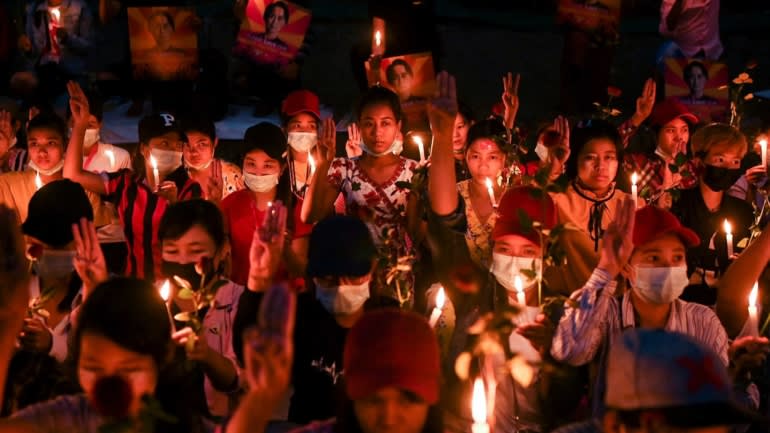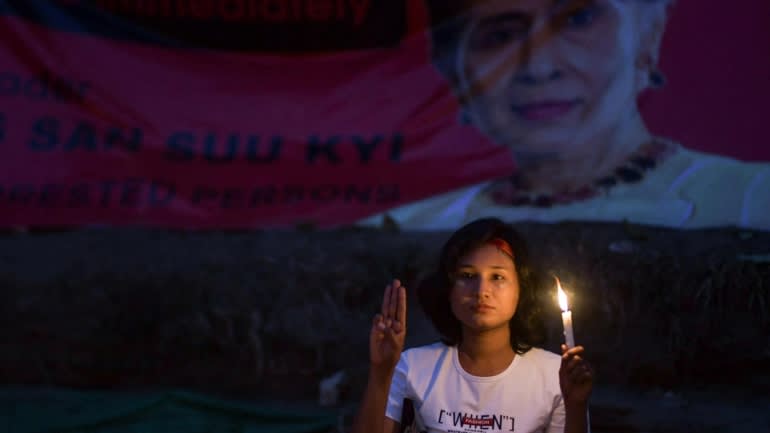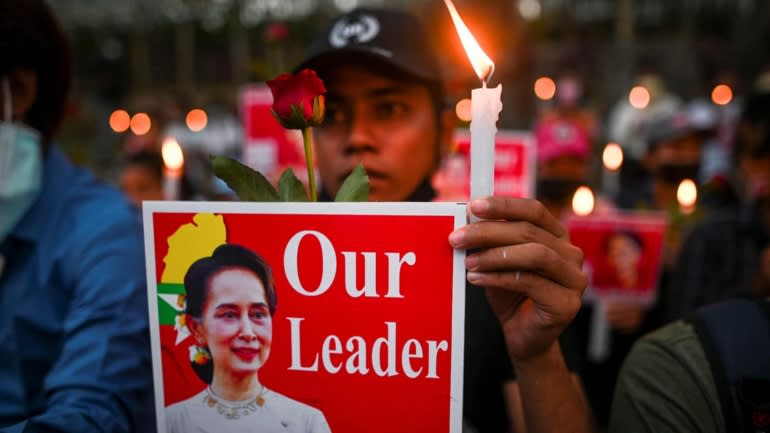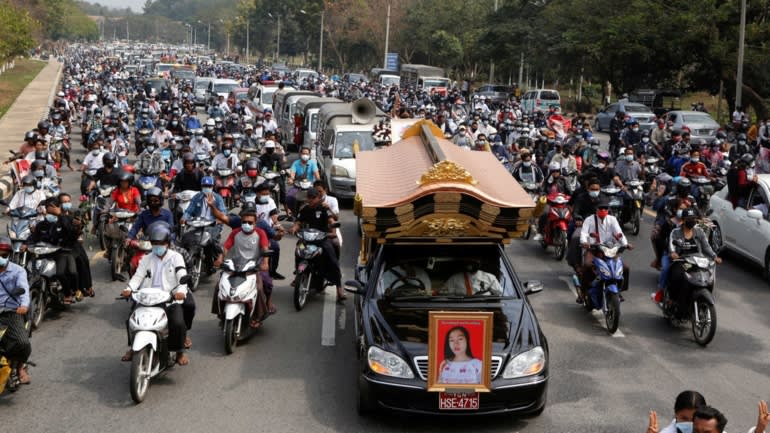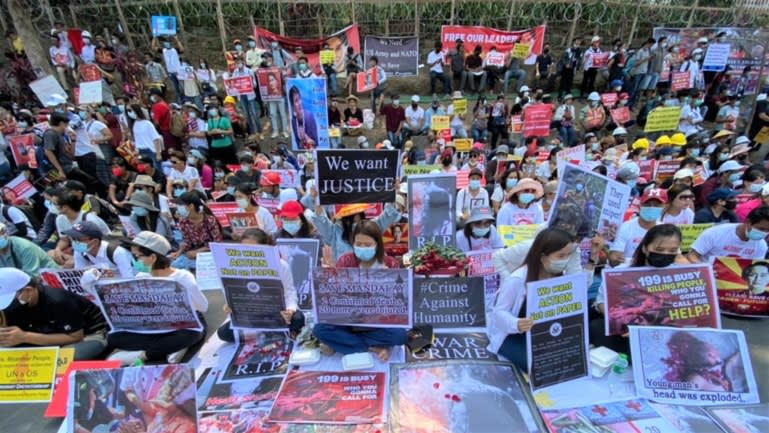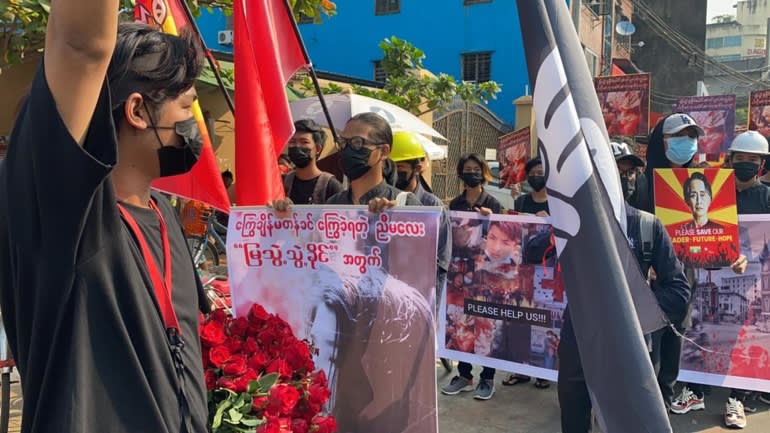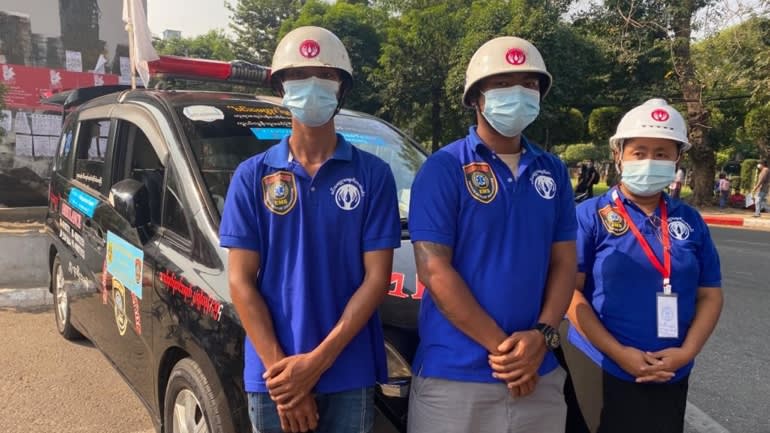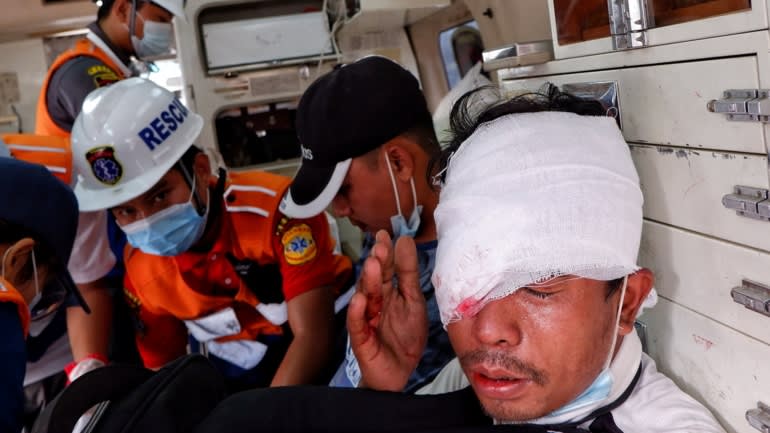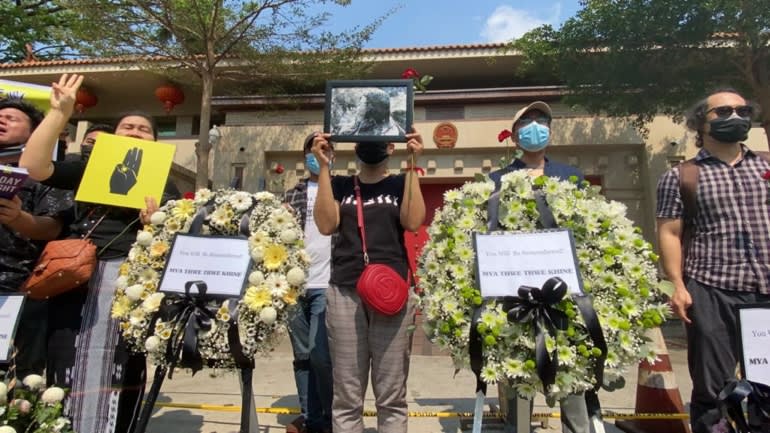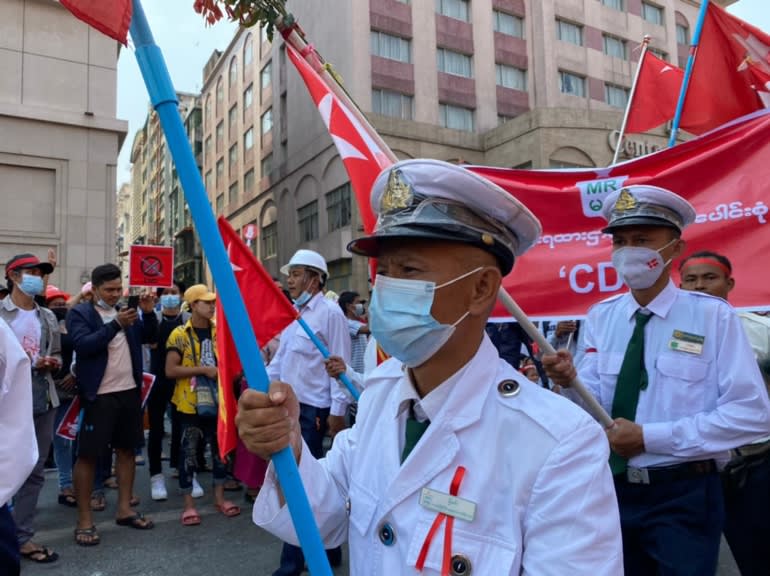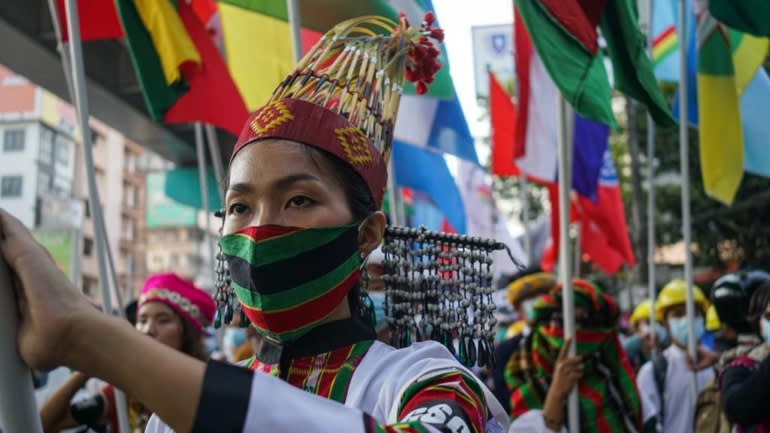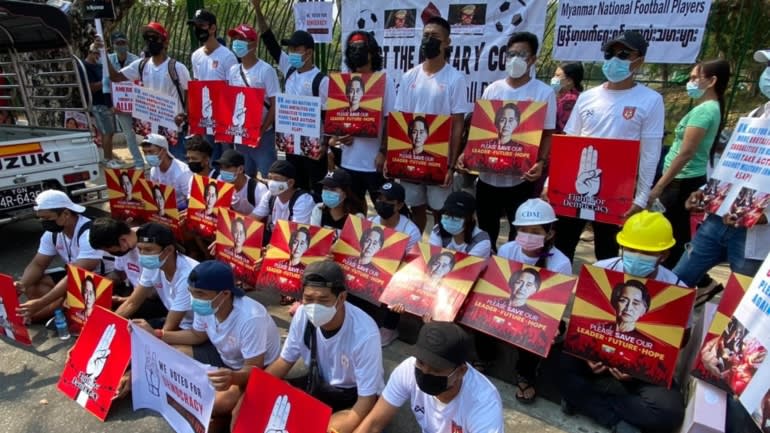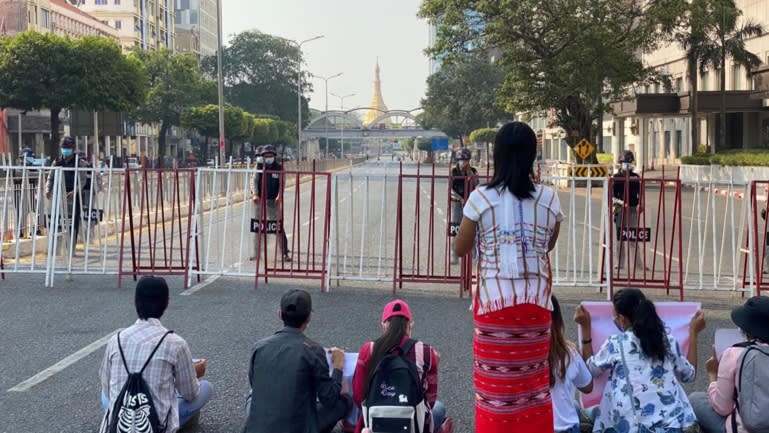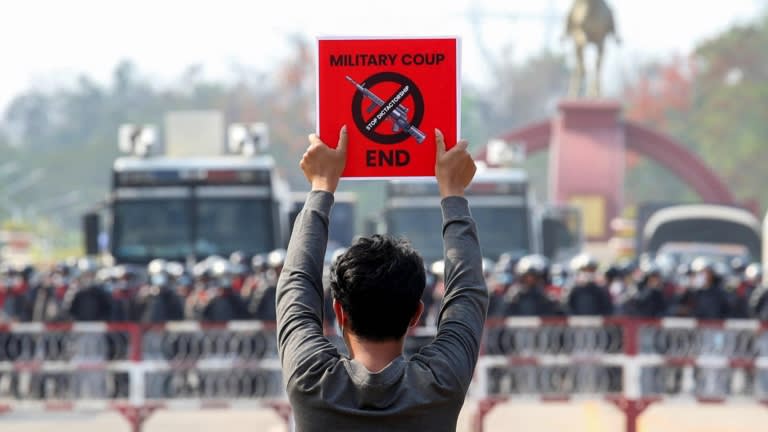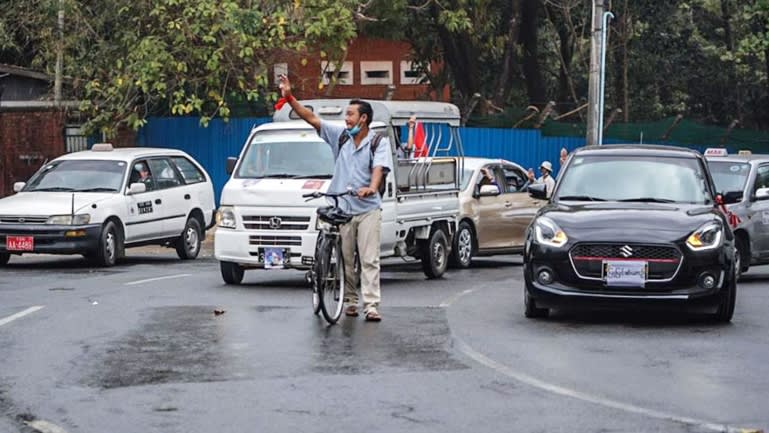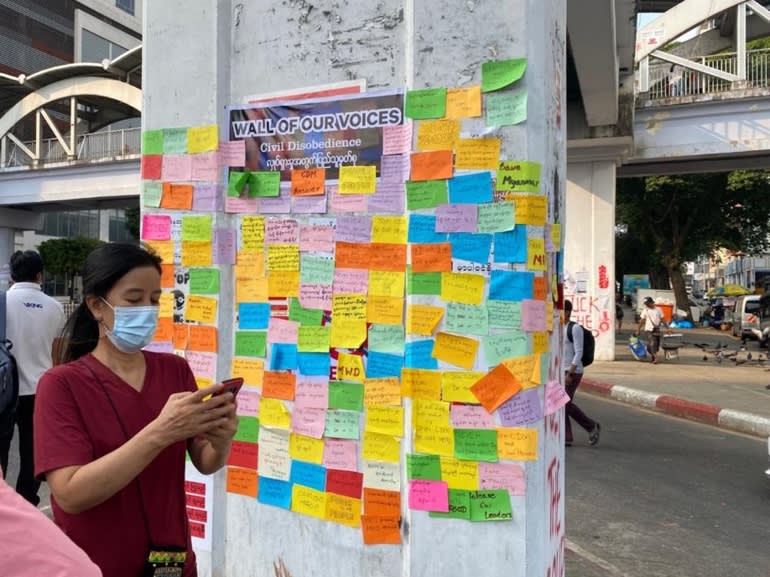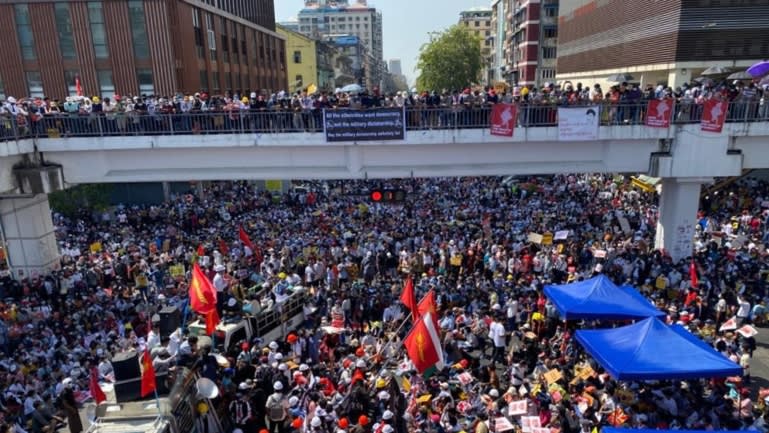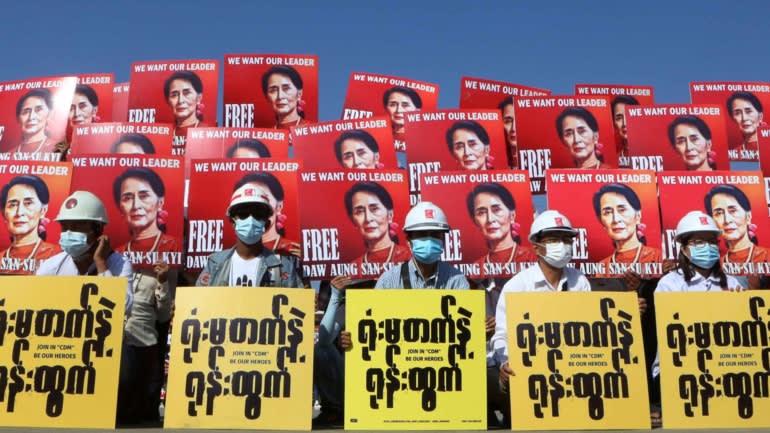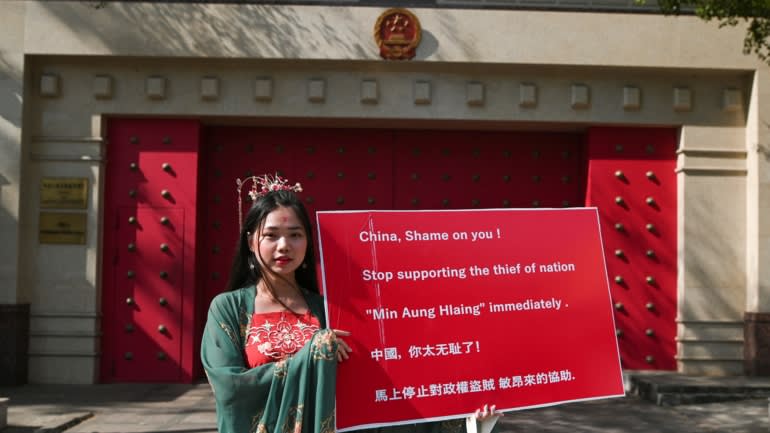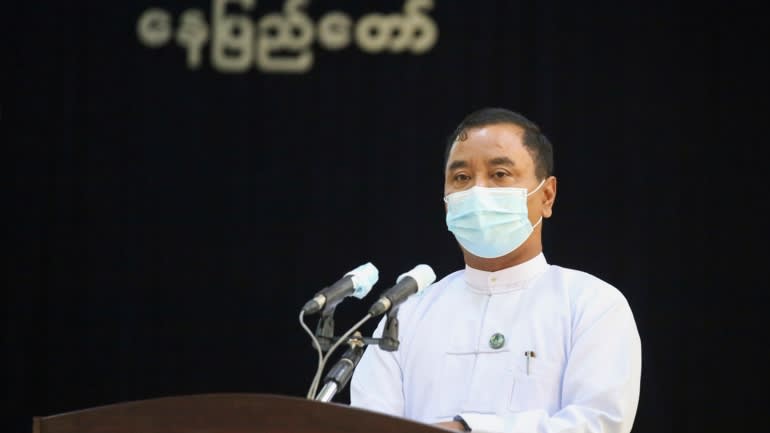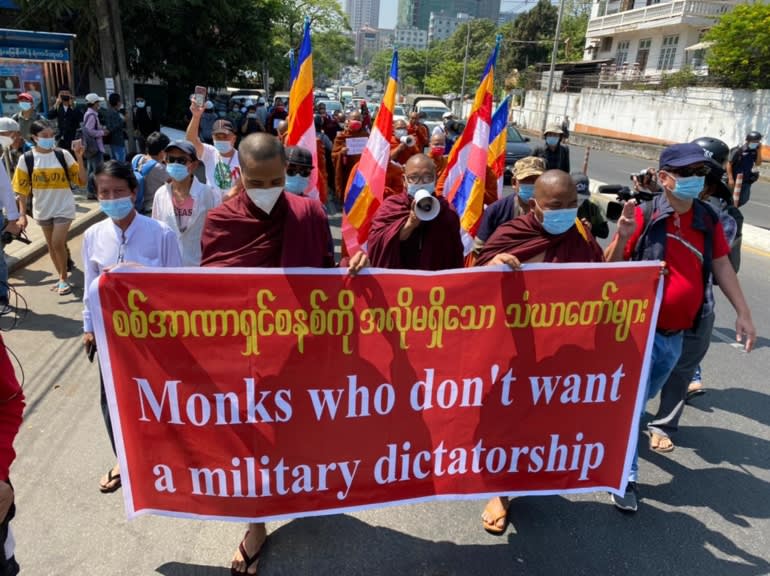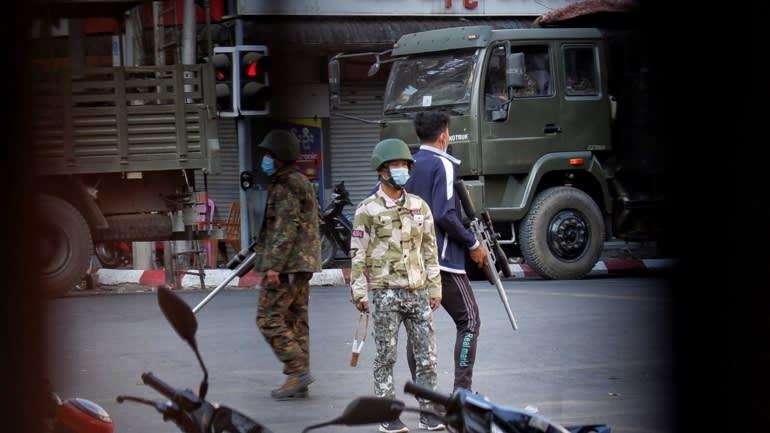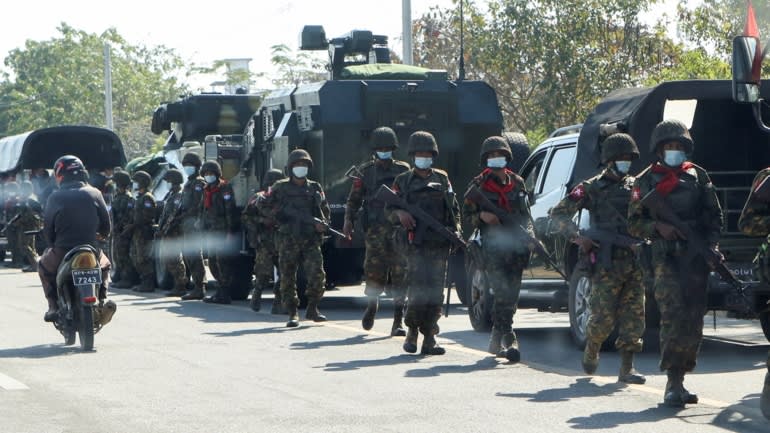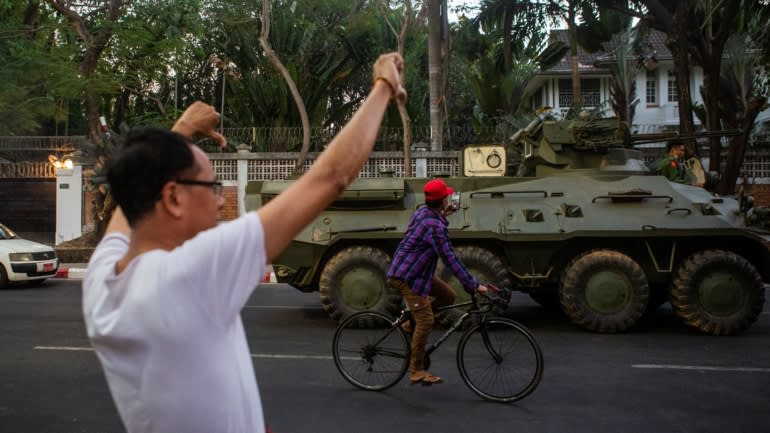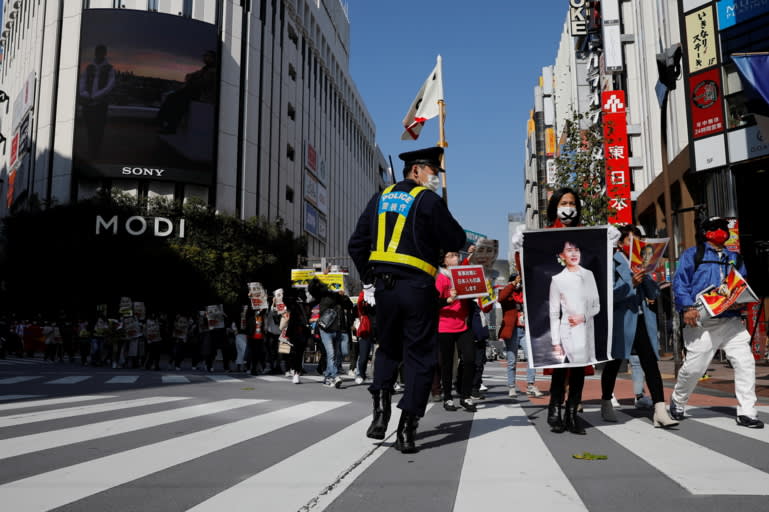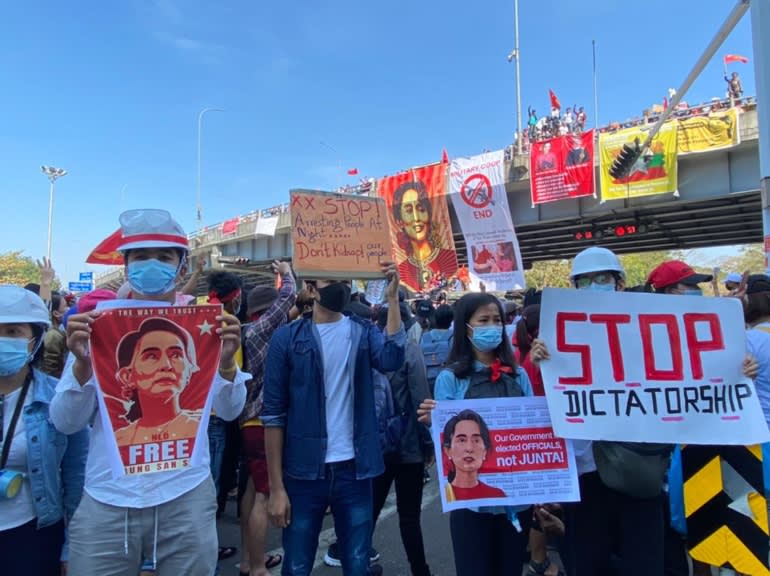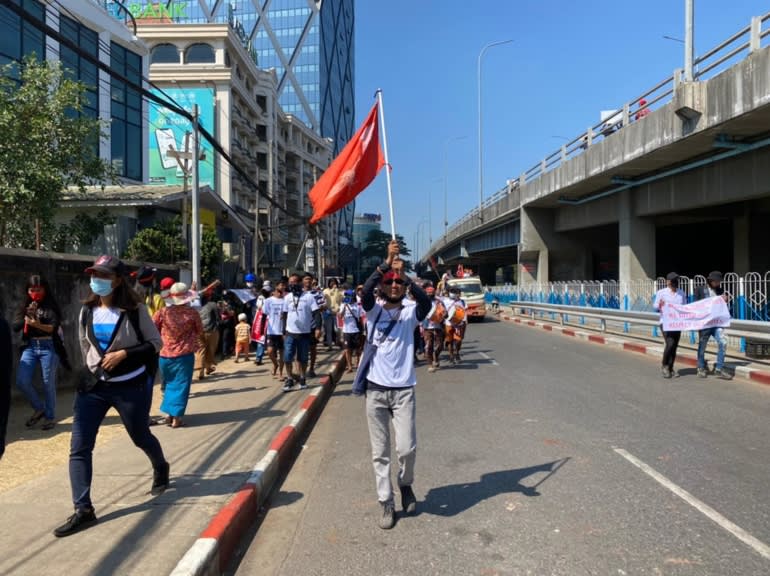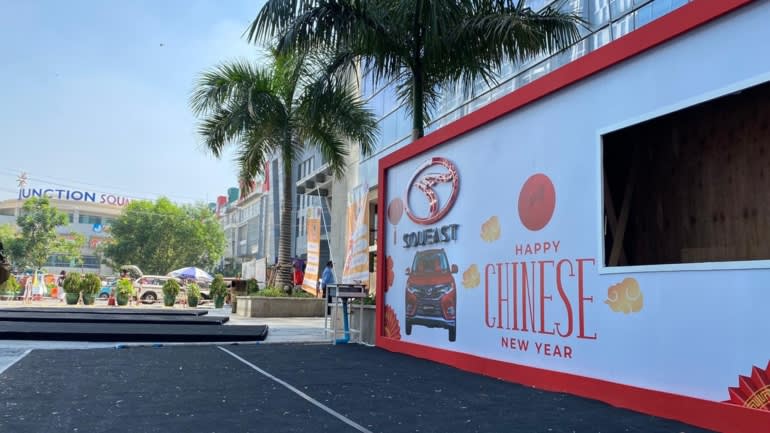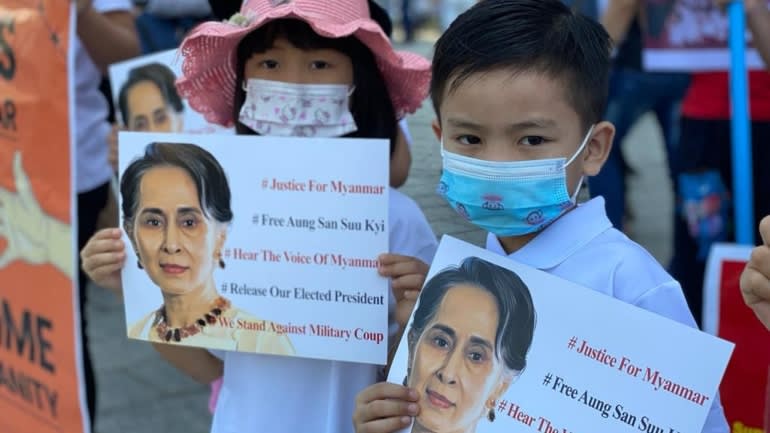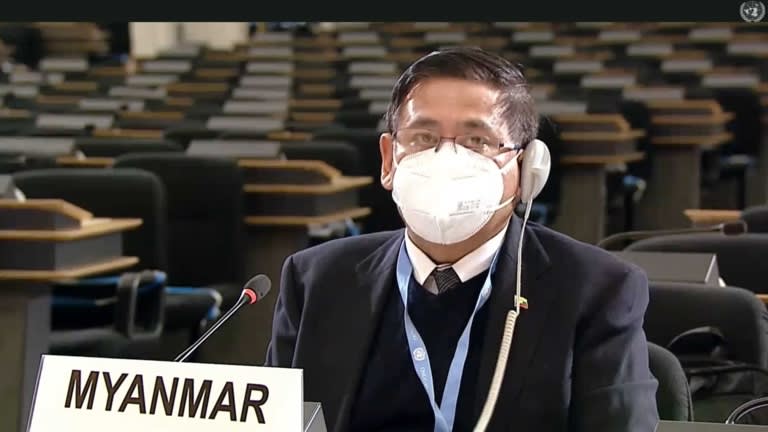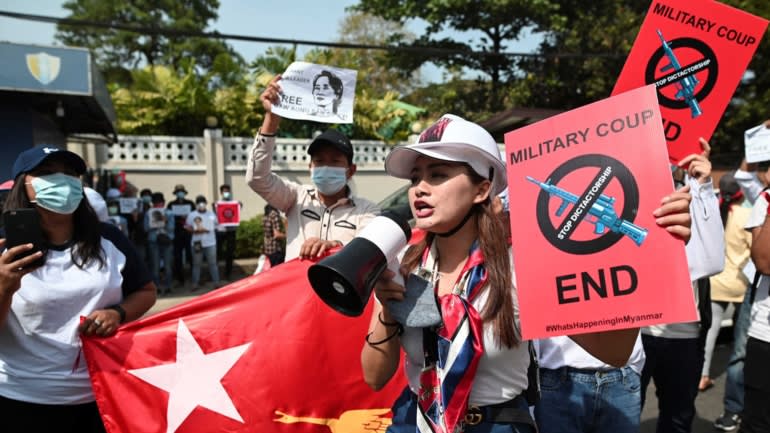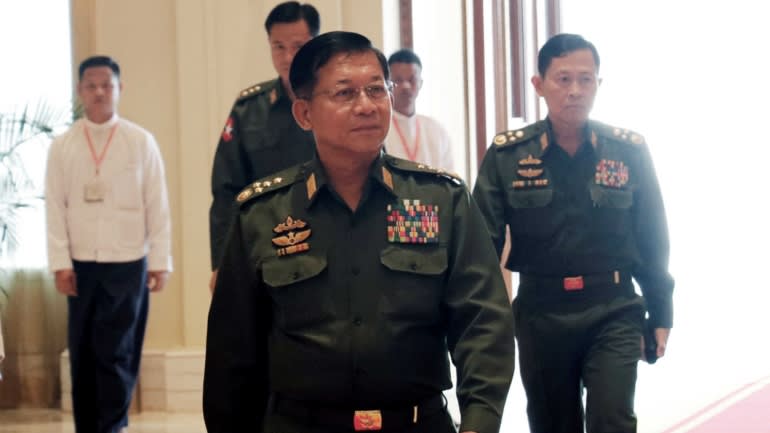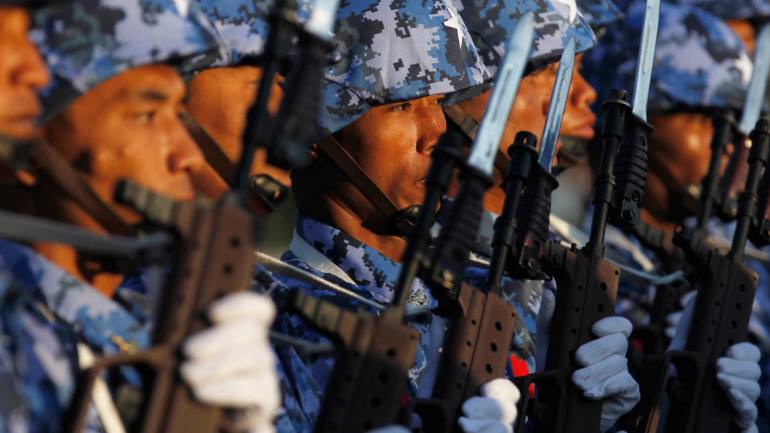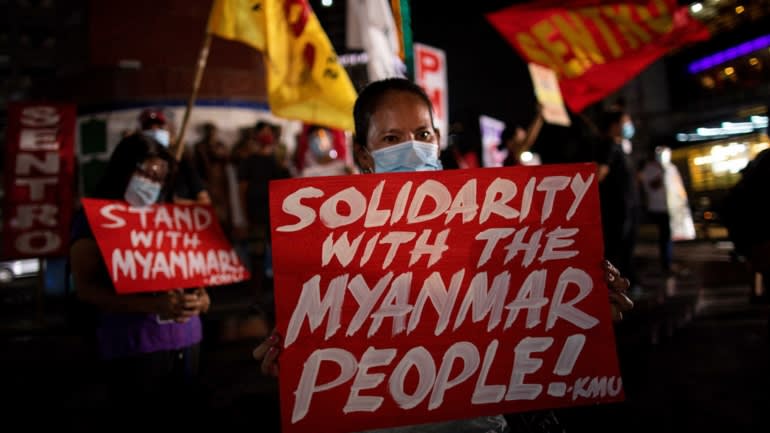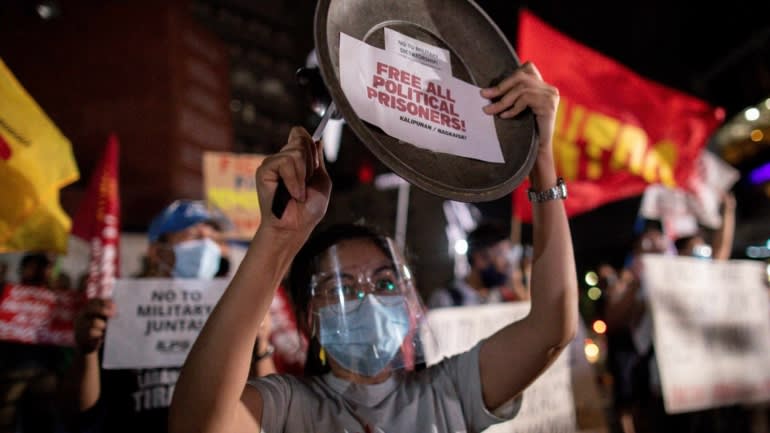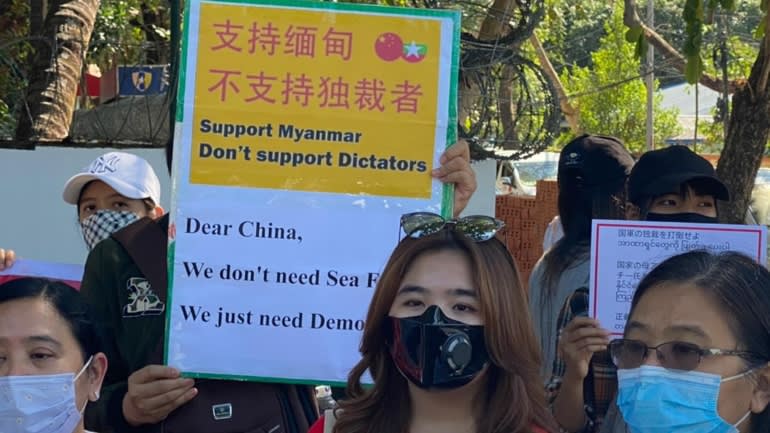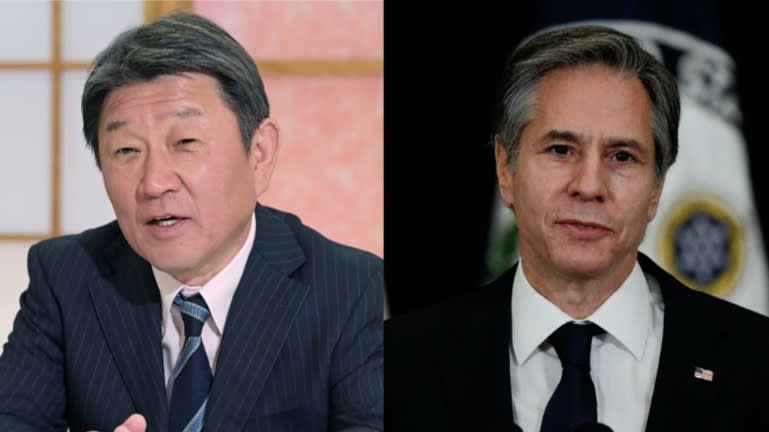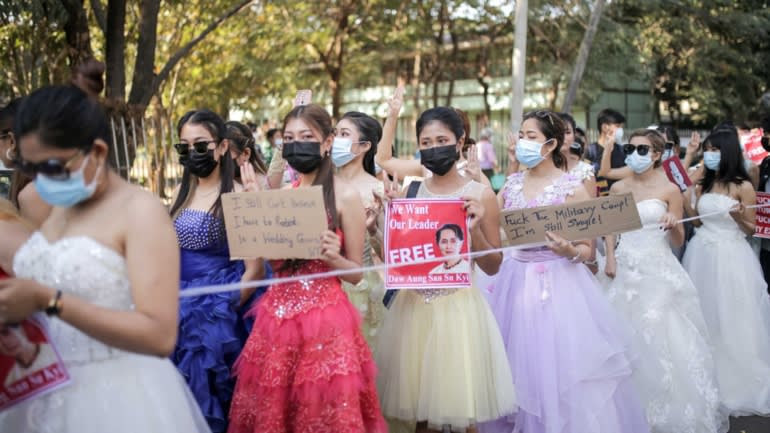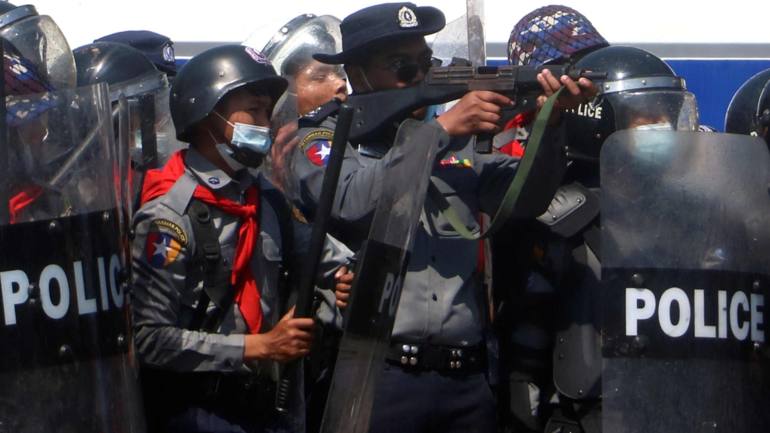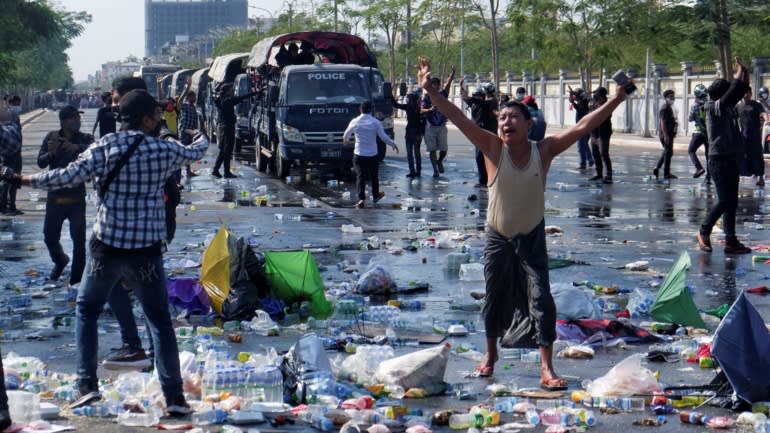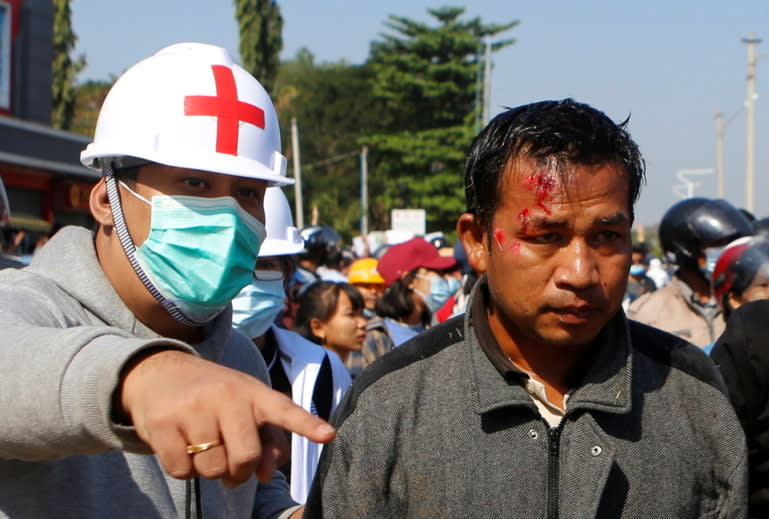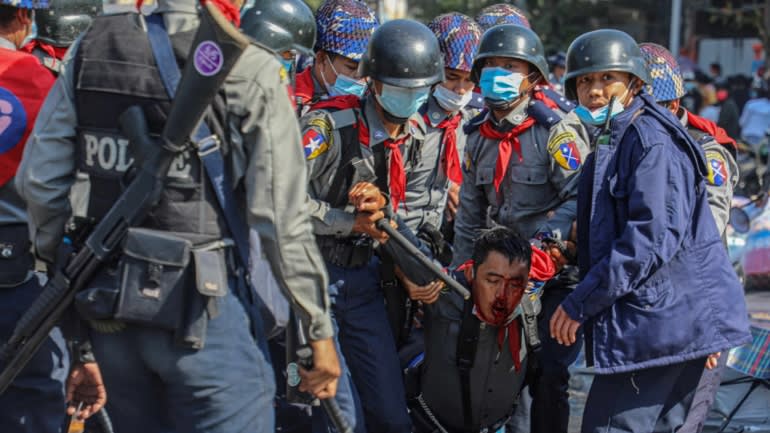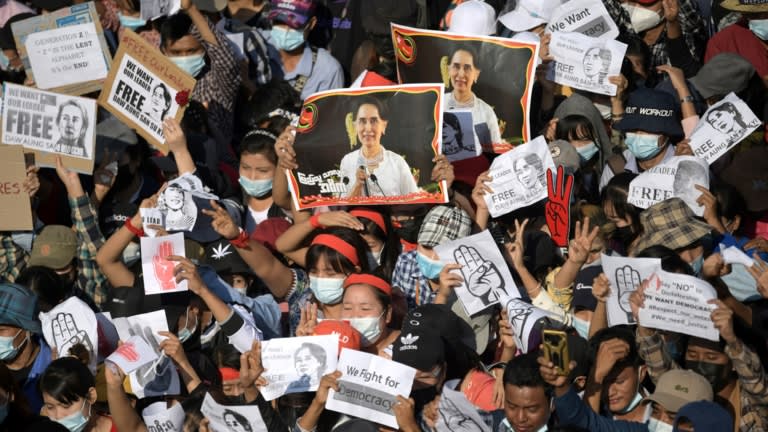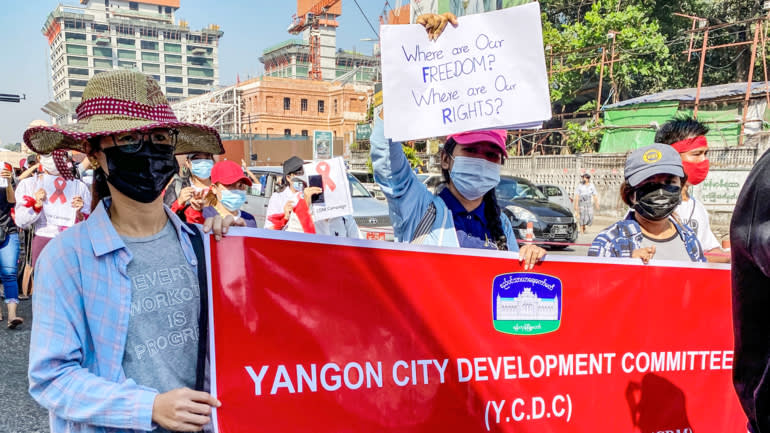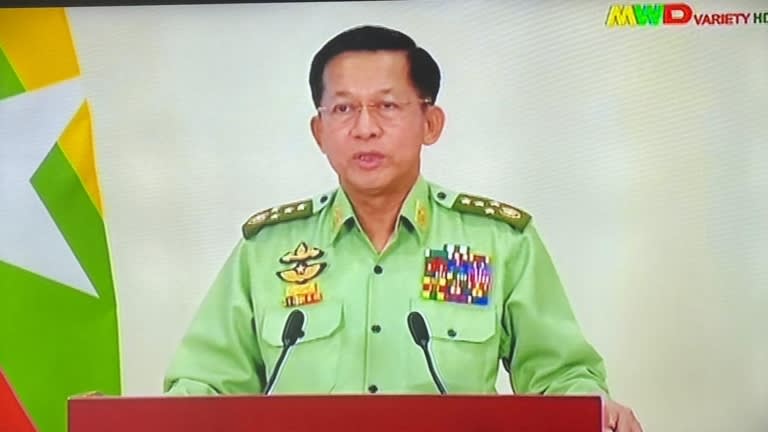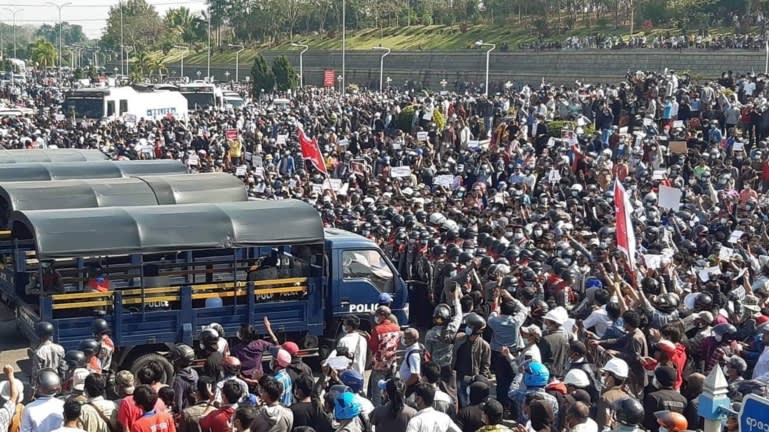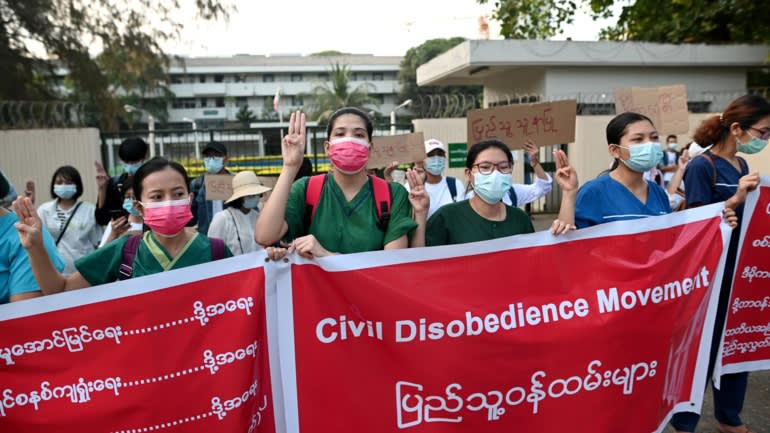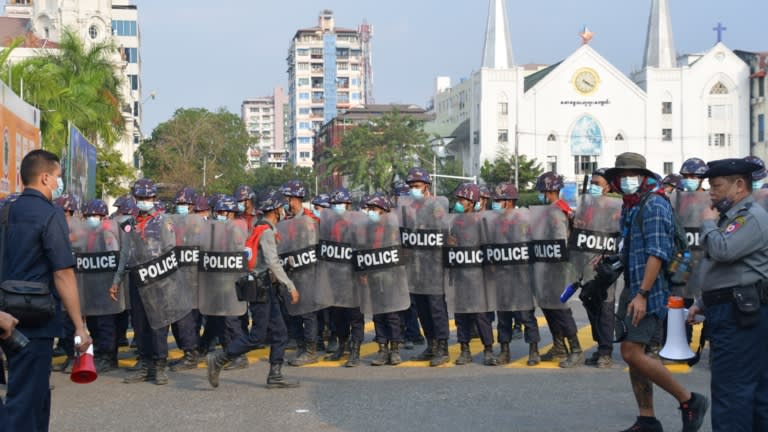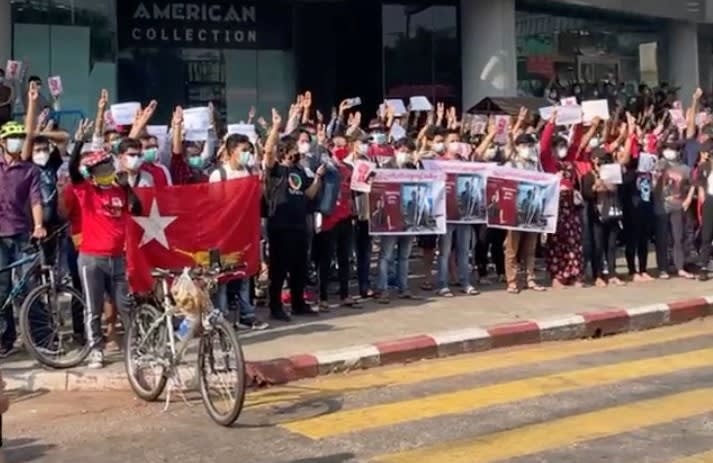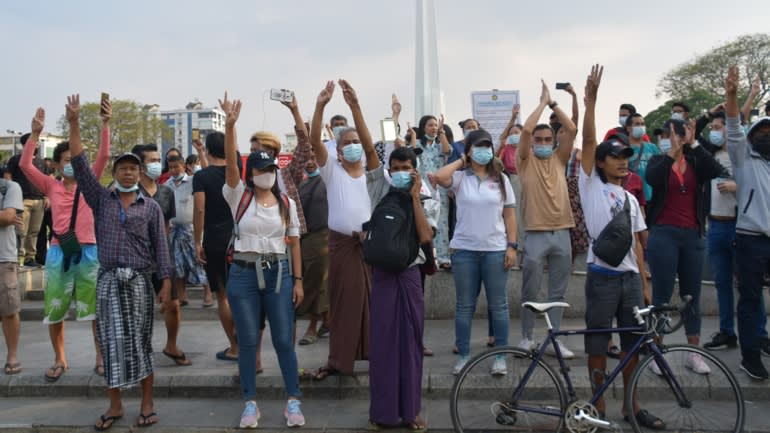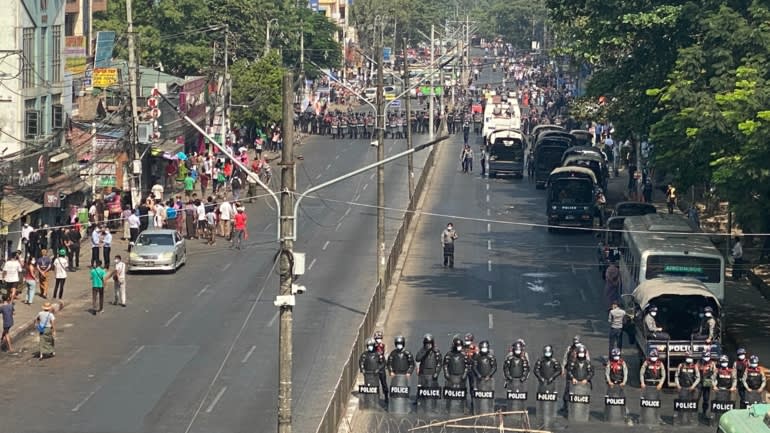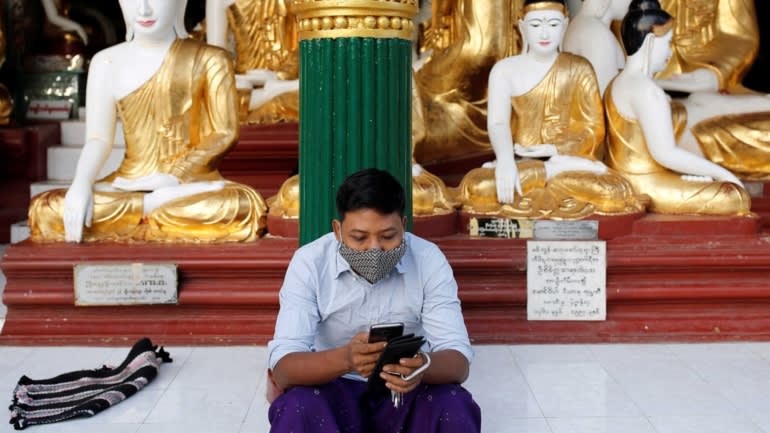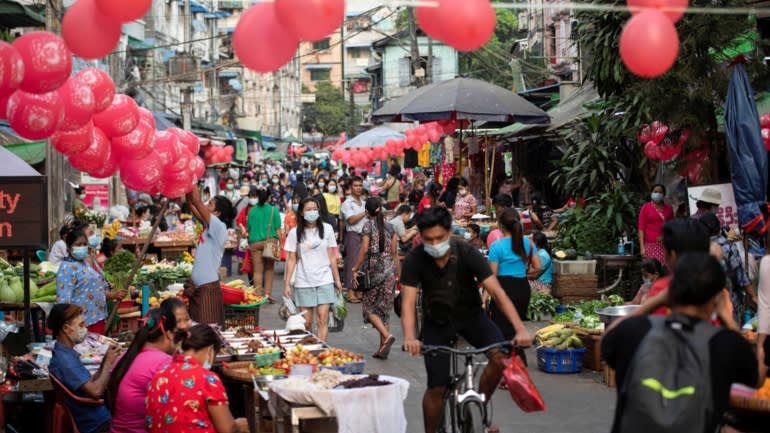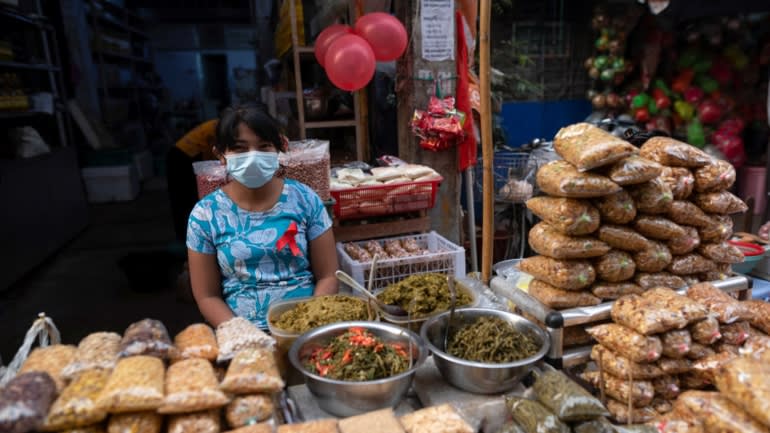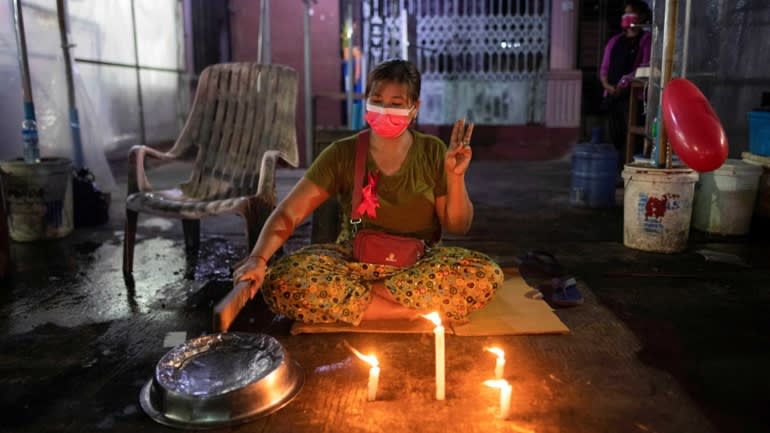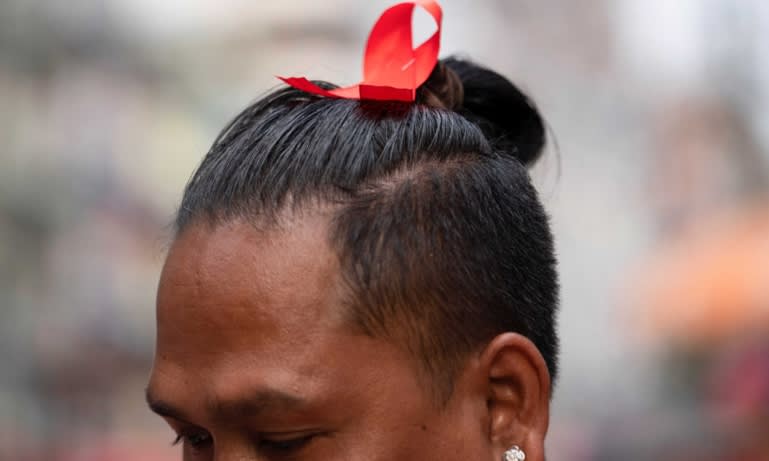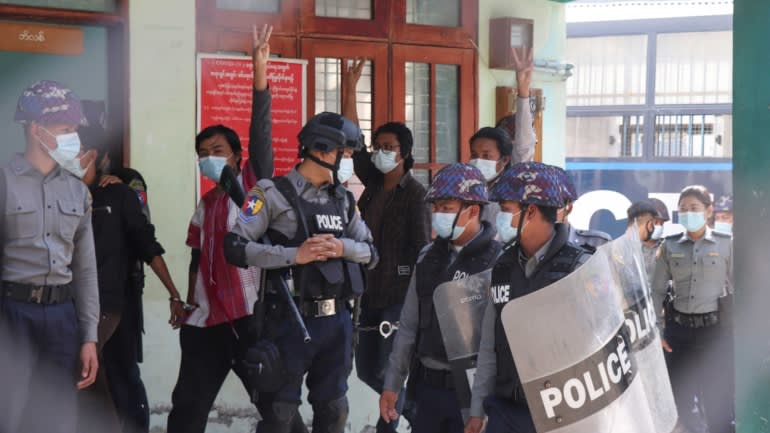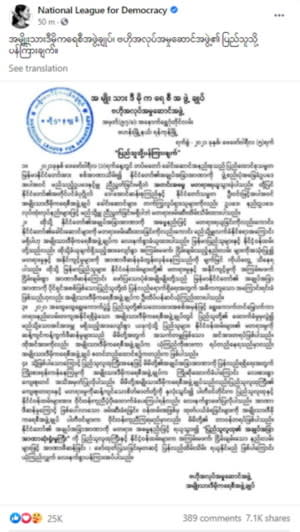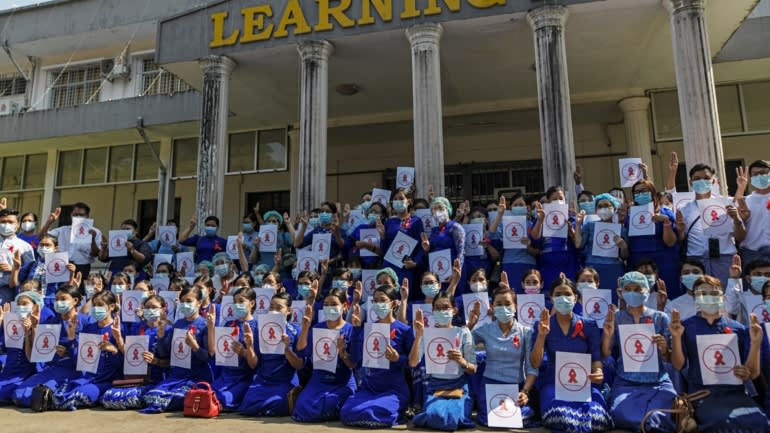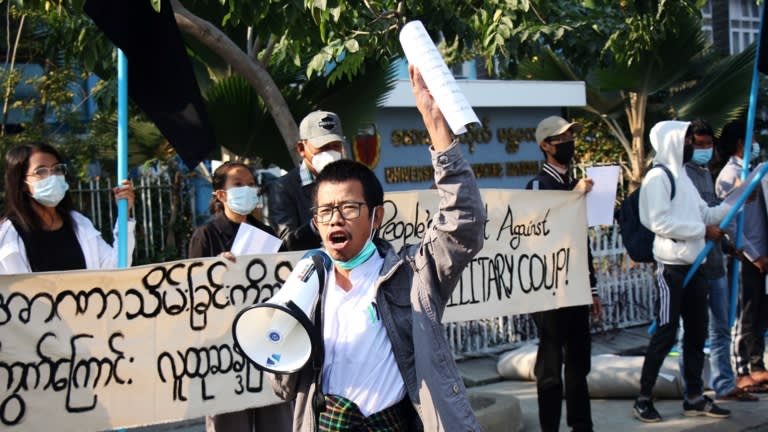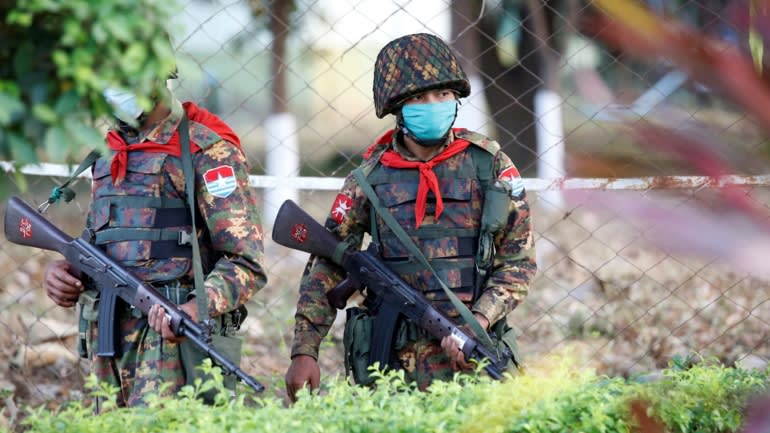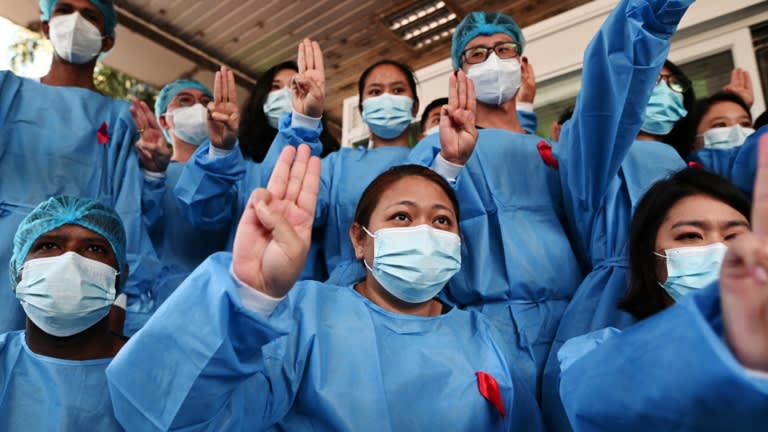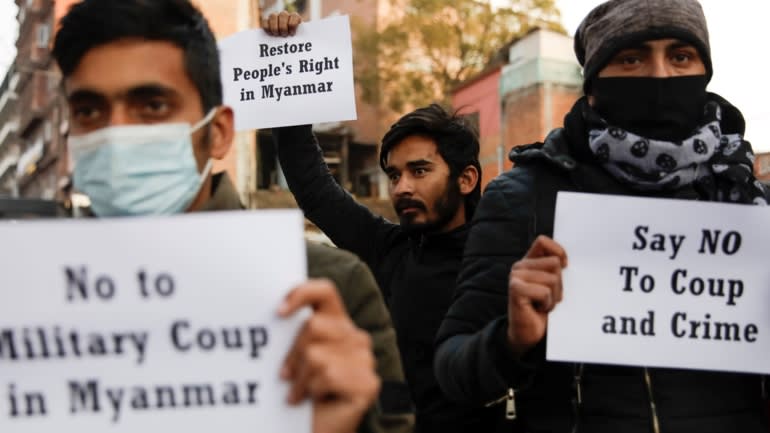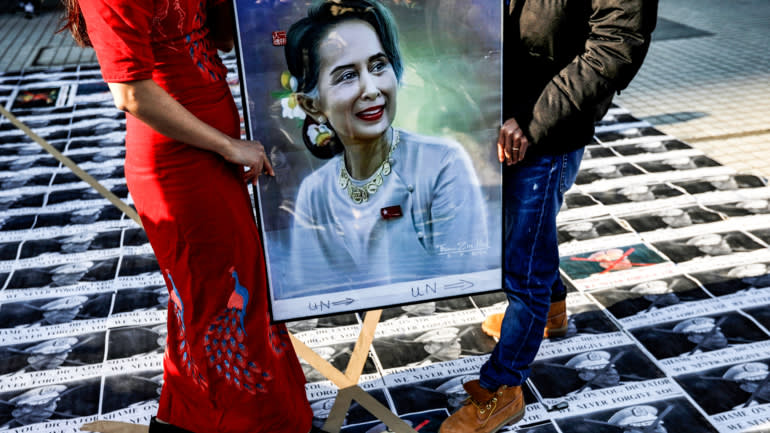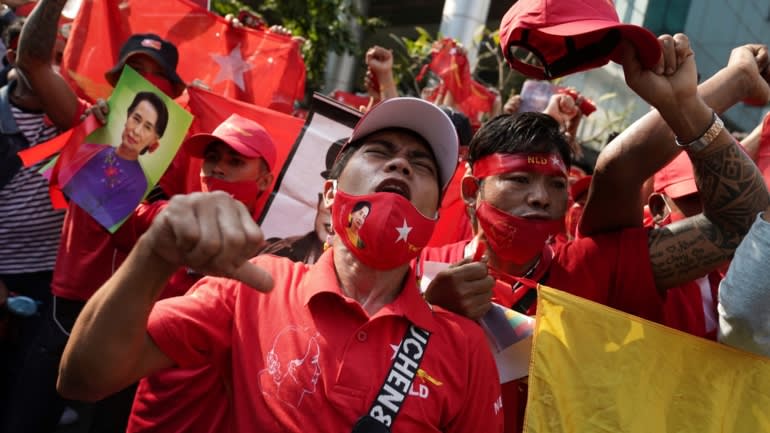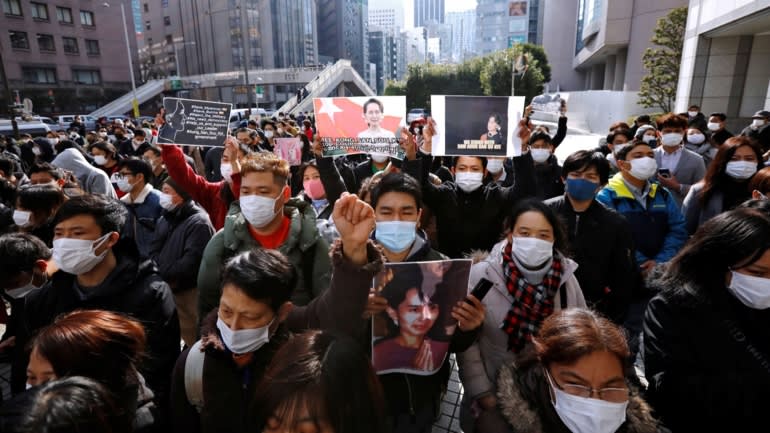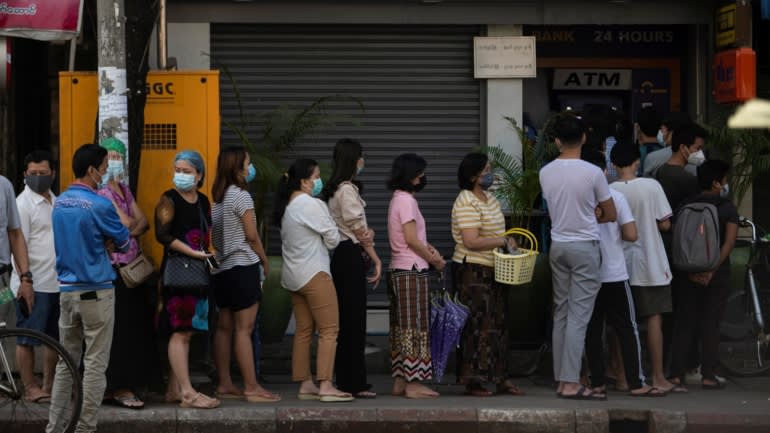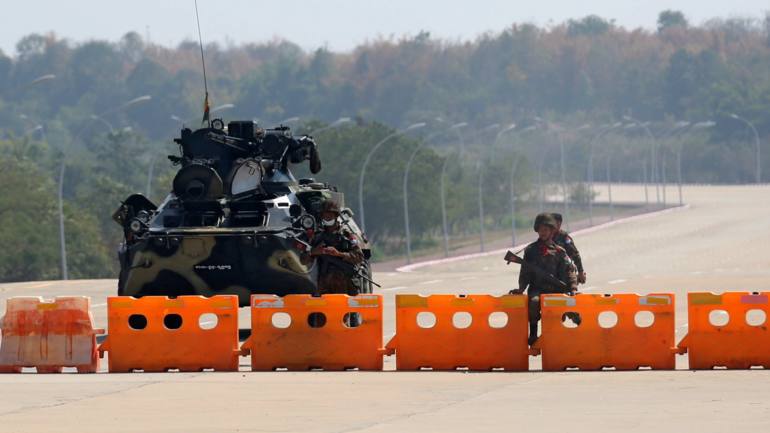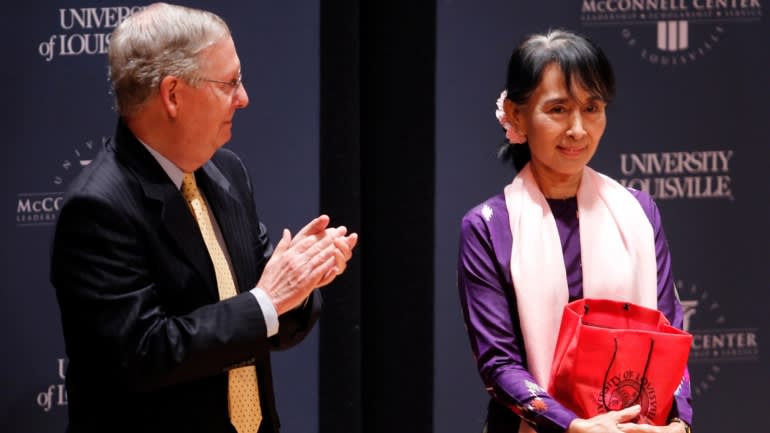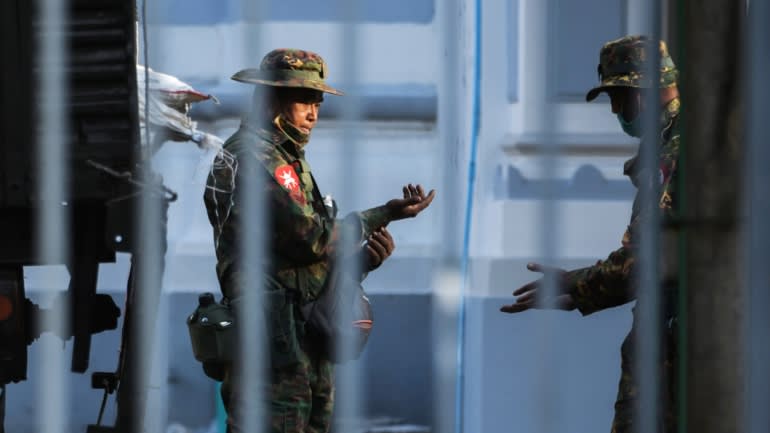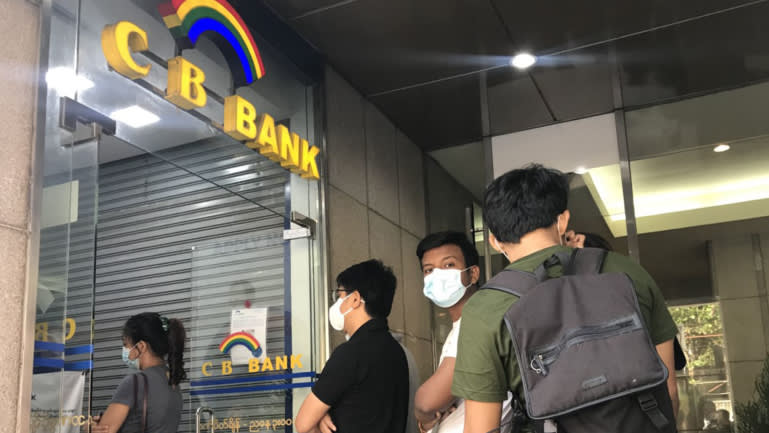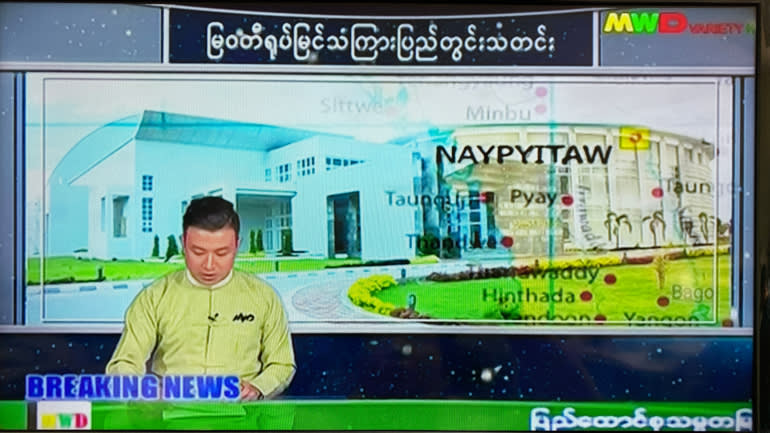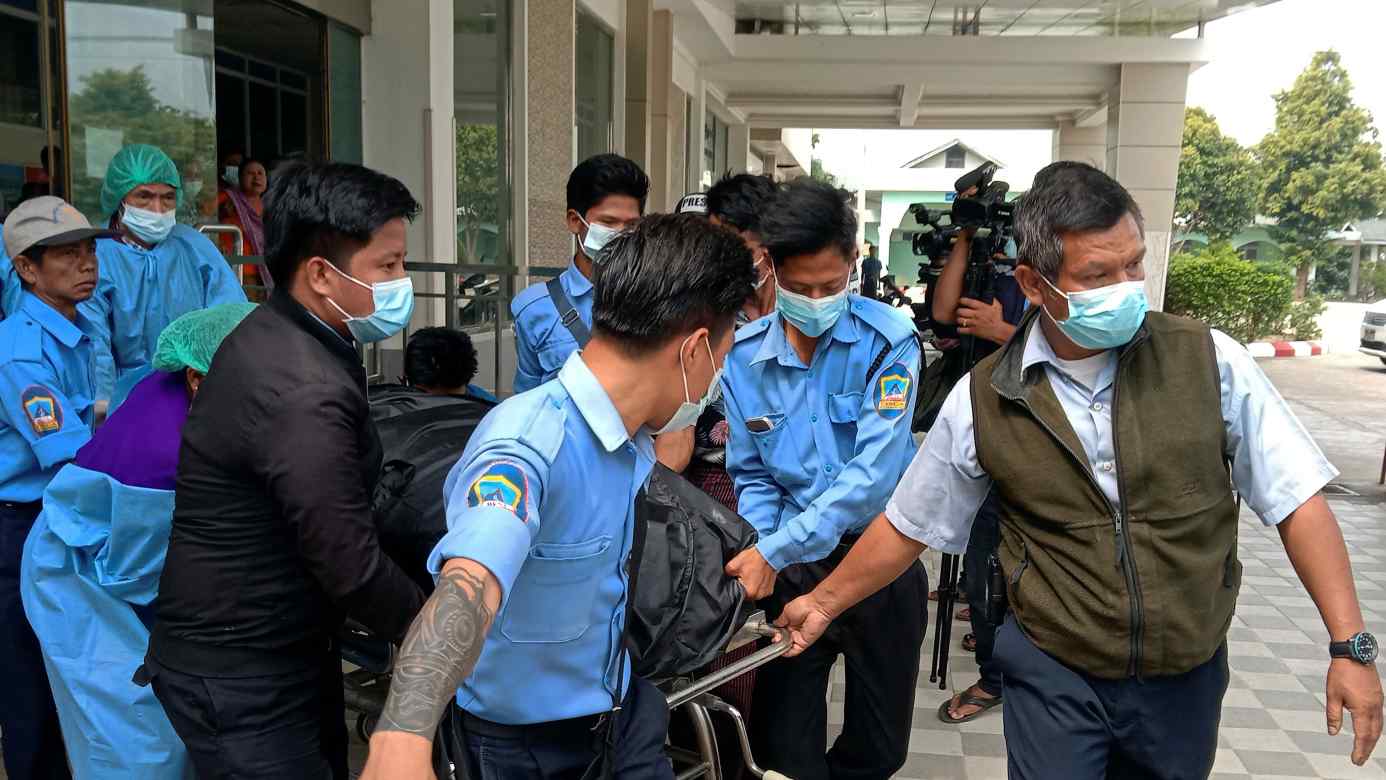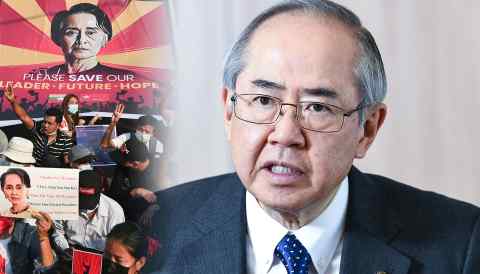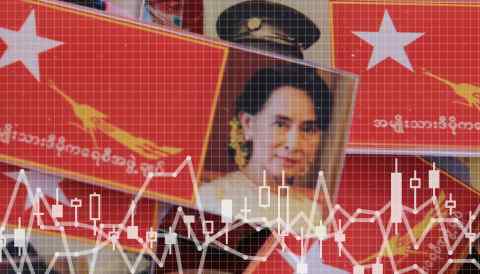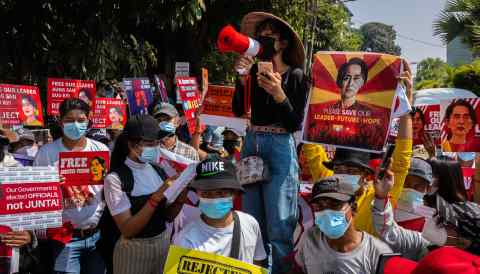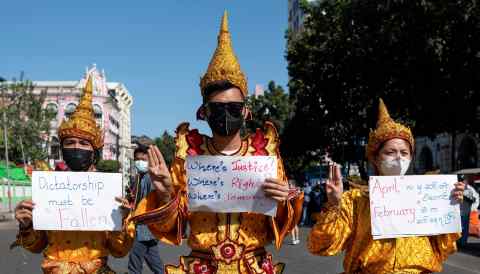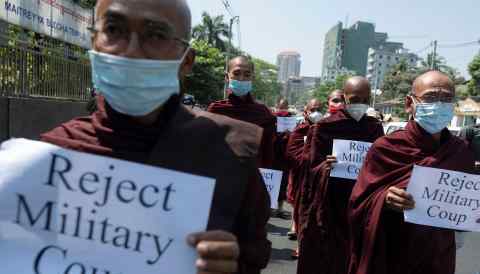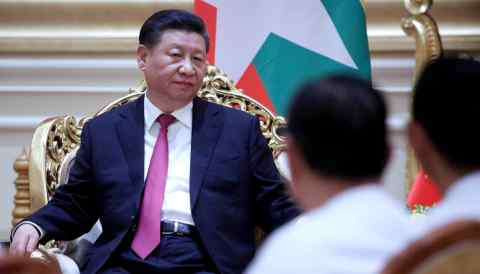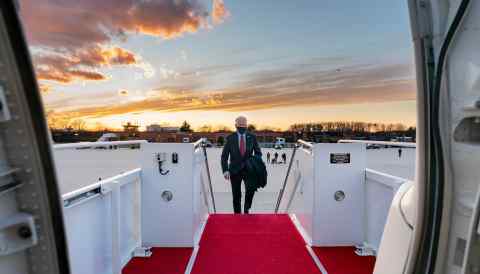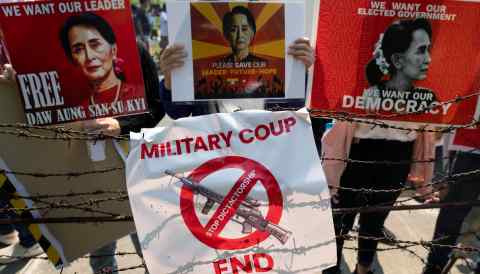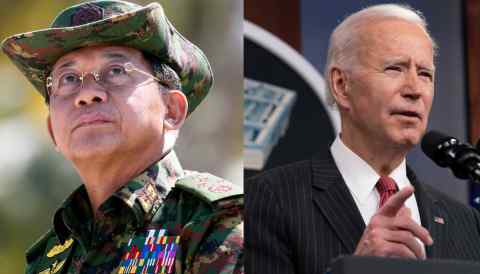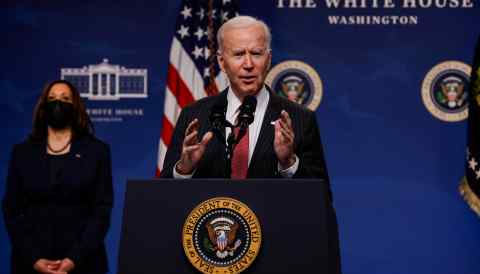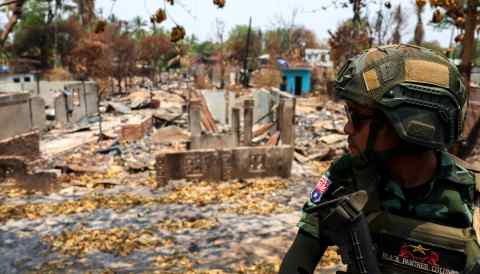YANGON/BANGKOK -- On Feb. 1, Myanmar's military detained State Counselor Aung San Suu Kyi and President Win Myint in the country's first coup since 1988, bringing an end to a decade of civilian rule.
The Suu Kyi-led National League for Democracy had won a landslide in a general election last November. But the military has claimed the election was marred by fraud.
For all our coverage, visit our Myanmar Coup page.
Read our in-depth coverage:
-- Myanmar college student shot by police dies as coup's 1st victim
-- Myanmar junta targets sweeping data access with cybersecurity bill
-- On Myanmar, Biden has multilateral ambitions but little leverage
-- Myanmar embraces Russian arms to offset China's influence
-- Who is Myanmar junta chief Min Aung Hlaing? 5 things to know
-- Myanmar: Inside the coup that toppled Aung San Suu Kyi's government
UPDATES CLOSED
To catch up on newer developments, see the next edition of latest updates.
Sunday, Feb. 21 (Yangon time)
11:30 p.m. Some scenes from Yangon, where protestors held a candlelight vigil against the coup.
11:00 p.m. The Assistance Association for Political Prisoners reports that 640 people in Myanmar have been arrested, charged or sentenced since the Feb. 1 coup.
1:30 p.m. City Mart, a leading supermarket chain, announces its stores will be closed on Monday and reopen on Tuesday.
1:00 p.m. The funeral of Mya Thwate Thwate Khaing, the young woman shot in the head by police, ends in Naypyitaw, the capital.
12:00 p.m. Activists call for a major protest on Monday to mourn the dead. They dub it 22222 based on the date, Feb. 22. The number is an allusion to 8888 -- Aug. 8, 1988 -- the date a six-week mass pro-democracy uprising kicked off nearly 33 years ago.
9:40 a.m. Police have arrested Lu Min, a famous actor wanted for supporting opposition to a Feb. 1 coup, his wife announces. The army said on Wednesday the celebrity was wanted under an anti-incitement law for encouraging civil servants to join protests. The charges can carry a two-year prison sentence. His wife, Khin Sabai Oo, said in a video posted on his Facebook page that police had come to their home in Yangon and taken him away.
9:34 a.m. Facebook removes military's main page under its policy of prohibiting the incitement of violence, the company said. "In line with our global policies, we've removed the Tatmadaw True News Information Team Page from Facebook for repeated violations of our Community Standards prohibiting incitement of violence and coordinating harm," a Facebook representative said in a statement. The Myanmar military is known as the Tatmadaw.
9:30 a.m. Medical staff prepare for emergencies in Yangon. One says: "We are here to save the lives of people."
5:32 a.m. The United States is "deeply concerned" by reports that Myanmar security forces have fired on protesters and continue to detain and harass demonstrators and others, U.S. State Department spokesman Ned Price said in tweet.
"We stand with the people of Burma," Price tweeted. Myanmar is also known as Burma.
Saturday, Feb. 20
11:55 p.m. The U.K. will consider further action against those involved in violence in Myanmar against people protesting the coup, Foreign Minister Dominic Raab says, after two people were killed when police and soldiers fired to disperse protests.
"The shooting of peaceful protesters in Myanmar is beyond the pale. We will consider further action, with our international partners, against those crushing democracy & choking dissent," Raab says in a tweet.
Britain imposed sanctions on three Myanmar generals on Thursday, accusing them of serious human rights violations following the coup.
8:48 p.m. Singapore expresses its dismay at reports of civilian casualties following the use of lethal force by security forces against demonstrators.
"The use of lethal weapons against unarmed civilians is inexcusable," the Foreign Ministry says in a statement. Two people were killed in Myanmar's second city Mandalay when police fired to disperse people protesting against the Feb. 1 military coup there, the bloodiest day in more than two weeks of demonstrations.
Singapore has been the largest source of foreign investment into Myanmar in recent years. "We strongly urge the security forces to exercise utmost restraint to avoid further injuries and loss of lives, and take immediate steps to de-escalate the situation and restore calm," Singapore's Foreign Ministry says.
6:35 p.m. Two people were killed in Myanmar's second city Mandalay when police fired to disperse protesters. "Twenty people were injured and two are dead," says Ko Aung, a leader of the Parahita Darhi volunteer emergency service agency in the city.
A volunteer doctor confirms there had been two deaths: "One shot in the head died at the spot. Another one died later with a bullet wound to the chest."
3:00 p.m. The older sister of Mya Thwate Thwate Khaing, the 20-year-old woman who was killed during the protests, says her funeral will be held on Sunday in the capital, Naypyitaw. "I really want the international community to help our country, rather than just watching, she said.
12:00 p.m. Protesters gather outside the Chinese Embassy in Yangon for a moment of silence to mourn a 20-year-old protester who was killed during demonstrations on Friday. "She was young and had a lot of opportunities, but now everything had been destroyed. The military is just [staying power with] weapons, and it keeps threatening us," said one male protester.
11:35 p.m. Railway staff march in Yangon and show support for the civil disobedience campaign in Myanmar.
11:00 a.m. Ethnic groups protest in a show of opposition to the coup that ousted Aung San Suu Kyi, despite some misgivings about her commitment to their aspirations for autonomy, community representatives said. "We can't form a federal country under dictatorship. We can't accept the junta," Ke Jung, a youth leader from the Naga minority told Reuters.
3:20 a.m. U.S. State Department spokesman Ned Price offers condolences on the death of a protester in Myanmar "We are saddened to see media reports that a protester shot by police in Naypyidaw on February 9 has died, marking the first reported death ... as a result of security forces response to the protests," Price said.
"We applaud yesterday's announcement of sanctions by the United Kingdom and Canada against the Burmese military leaders responsible for the coup," Price also says, adding that Secretary of State Antony Blinken had discussed with Australian, Indian and Japanese counterparts "the urgent need to restore the democratically elected government in Burma."
Friday, Feb. 19
9:30 p.m. U.K. Prime Minister Boris Johnson, chairing today's virtual Group of Seven summit, sounds a note of solidarity on the G-7's response to the coup.
"The G7 is the great gathering of like-minded liberal free-trading democracies, it's a very very important forum, we stand together on many issues around the world, whether its our views on the coup in Myanmar... or on the detention of Alexei Navalny in Moscow," Johnson says.
5:00 p.m. A Singaporean company that sold anti-drone products to Myanmar's police force is halting its business in the country, Reuters reports, citing a company representative.
"We have no plan to supply anti-drone products to Myanmar until a lawful society is re-established," Sam Ong, managing director of TRD Consulting, is quoted as saying in an email. "We will review the future sales accordingly."
He says the company was in the process of selling its products to Yangon International Airport but has canceled the deal. He also says TRD will not supply Myanmar's military.
Singapore has been one of Myanmar's biggest sources of investment in recent years.
1:00 p.m. A young woman who was shot in the head last week as police tried to disperse a crowd died on Friday, her brother said. Mya Thwate Thwate Khaing, who just turned 20, had been on life support since being taken to a hospital on Feb. 9, after she was hit by what doctors said was a bullet during a protest in the capital, Naypyitaw. She is the only protester to have been killed since Myanmar's army seized power on Feb. 1. A 36-year-old interior designer participating in protests in Yangon said, "I am very sad. We will fight for democracy."
11:00 a.m. Myanmar national soccer players join the protests in Yangon.
9:30 a.m. Police erect a barricade at the main intersection of Sule Pagoda Road in downtown Yangon to prevent protests. But a few hundred defiant protesters gather near the barricade.
A 19-year-old female student said: "Please help Myanmar people. We need State Counselor Aung San Suu Kyi and President Win Myint back." She added, "At night, we are worried about the police arresting us at our houses, so we are going to bang pots when we see strangers in the neighborhood."
9:00 a.m. Access to the internet resumes after the junta shut it down starting at 1 a.m.
8:00 a.m. Myanmar's coup creates a minefield for business, Nikkei Asia reports. Fears of a digital crackdown undercut hope the junta will improve on Suu Kyi's economic policies. Read more here.
2:00 a.m. In a coordinated move with the U.K., Canada has imposed sanctions on nine figures associated with the Myanmar coup.
They include junta leader Min Aung Hlaing and Defense Mya Tun Oo, who was just sanctioned by the U.K., according to a statement by Global Affairs Canada, the country's foreign ministry.
"Following recent measures by the United States, and in coordination with the United Kingdom, the sanctions announced today are part of a united response to send a clear message that Canada will not accept the actions of the Myanmar military and their complete disregard for the will and democratic rights of the people of Myanmar," the statement says.
1:00 a.m. Malaysia remains committed to repatriating around 1,200 Myanmar nationals held in the country's immigration detention centers next Tuesday, despite strong protests from civil rights groups and the United Nations High Commissioner for Refugees.
While Myanmar is in turmoil over the recent military coup, a source in Malaysia's Immigration Department tells Nikkei Asia the detainees will be sent back as scheduled, requesting anonymity because he was not authorized to speak. An analyst, meanwhile, acknowledges Malaysia's concerns about illegal immigration but argues the controversy shows the need for better coordination with the U.N.
12:50 a.m. The World Bank will assess future aid initiatives in Myanmar with greater care in light of the military coup, the lender's President David Malpass says.
"The way I would characterize our current position is extra cautious," Malpass is quoted as saying by Reuters. "I don't want to call it a pause ... we're continuing to execute on the past projects as we implement them."
Thursday, Feb. 18
10:00 p.m. U.S. Secretary of State Antony Blinken discusses Myanmar with his "Quad" counterparts Marise Payne of Australia, Subrahmanyam Jaishankar of India and Toshimitsu Motegi of Japan.
"The ministers discussed ... the urgent need to restore the democratically elected government in Burma, and the priority of strengthening democratic resilience in the broader region," State Department spokesperson Ned Price says in a statement.
9:50 p.m. The U.K. announces sanctions on three figures in Myanmar's junta accused of "serious human rights violations" as well as measures to stop British businesses from working with the Southeast Asian nation's armed forces.
Britain's Foreign Ministry says sanctions have been imposed on Myanmar's defense minister, Gen. Mya Tun Oo; the minister for home affairs, Lt. Gen. Soe Htut; and his deputy, Lt. Gen. Than Hlaing.
"The U.K. condemns the military coup and the arbitrary detention of Aung San Suu Kyi and other political figures," Foreign Secretary Dominic Raab says. "We, alongside our international allies, will hold the Myanmar military to account for their violations of human rights and pursue justice for the Myanmar people."
The Foreign Ministry's statement added that "further safeguards are now being put in place to prevent U.K. aid indirectly supporting the military-led government following the conclusion of an aid review."
8:00 p.m. Japanese brewer Kirin Holdings seeks a "swift end" to its alliance with a company affiliated with Myanmar's military, Kirin's CEO says in an interview, as protests against the military coup continue to rage in the Southeast Asian country.
"I want to end our relationship with the [Myanmar] military," Kirin President and CEO Yoshinori Isozaki says. "I want to settle it by spring, and definitely within a year."
Kirin said on Feb. 5 that it will terminate the partnership with Myanma Economic Holdings (MEHL), which co-owns two beer joint ventures in Myanmar, Myanmar Brewery and Mandalay Brewery, arguing that the military's actions "were against our standards and Human Rights Policy."
"Popularity is vital for the beer business," Isozaki says. "The longer this situation lasts, the more disadvantageous it becomes."
4:00 p.m. Protesters in Myanmar are writing down messages on paper and pasting them on walls, creating their own "Lennon Walls." Hong Kongers also took on this form of protest in 2019-2020. The first Lennon Wall was created in Prague after the assassination of Beatles member John Lennon in 1980.
3:00 p.m. The foreign ministers of Singapore and Indonesia support a proposed informal Association of Southeast Asian Nations ministerial meeting to discuss the situation in Myanmar, the city-state's foreign affairs ministry said.
The statement was issued after Indonesia's minister of foreign affairs Retno Marsudi met her counterpart Vivian Balakrishnan in Singapore on Thursday.
10:00 a.m. The army announced on Wednesday night that six celebrities -- including film directors, actors and a singer -- were wanted for possible violation of an anti-incitement law, specifically for encouraging strikes that have paralyzed government offices. The number of people detained since the coup reached 495 by Wednesday, Myanmar's Assistance Association for Political Prisoners said in a statement. Of these, 460 were still being held.
Wednesday, Feb. 17
10:40 p.m. Videos circulating on Twitter show people crossing the same road over and over again to slow the flow of traffic.
5:00 p.m. "We are not afraid of the crackdown and that's why we are here. I am happy to see people on the streets even though it's a scary time. But we will fight against the military," a young male protester in Yangon told Nikkei.
3:30 p.m. Large crowds have gathered on the streets in downtown Yangon in one of the largest demonstrations since the coup, witnesses say. After the junta held its first news conference on Tuesday, people took their anger against the false claims by the military to the streets.
12:00 p.m. In Yangon and elsewhere, a broken-down car campaign spreading on social media has resulted in motorists stopping their vehicles on streets and bridges. The campaign is meant to block police and military trucks. The drivers who stopped also got out of their cars and checked under their hoods. Social media activists are also calling for a massive demonstration on Wednesday, an apparent attempt to turn the tide as protests in Yangon have been noticeably smaller since the military began patrolling the streets days ago.
9:30 a.m. Internet service has resumed following another blackout starting at 1 a.m. Protesters marched in the main roads in Yangon to express their anger over additional charges brought against ousted leader Aung San Suu Kyi.
3:50 a.m. The Myanmar coup has emerged as the first major diplomatic challenge for U.S. President Joe Biden since his Jan. 20 inauguration.
On Feb. 10, the day Biden announced sanctions on Myanmar's military leaders, a senior State Department official briefed bipartisan members of the House Foreign Affairs Committee on the situation in the Southeast Asian country.
While lawmakers expressed strong support for the condemnation of the coup and the need for a return to democratic control, they also recognized that Washington has little direct leverage over Myanmar to persuade the junta to change course.
"There was an urging by both Republican and Democratic members to pursue a multilateral sanctions-and-pressure campaign against Myanmar to exert more leverage, and in particular convince Japan and Singapore to act, given they are Myanmar's largest financial partners behind China," according to one participant in the briefing. Read more.
1:20 a.m. U.S. Secretary of State Antony Blinken and Indonesian Foreign Minister Retno Marsudi express "deep concern over the coup in Burma" in a phone call.
Blinken also "agreed on the key role of ASEAN-centrality in the Indo-Pacific, and underscored the importance of protecting and preserving a free and open South China Sea," according to U.S. State Department Spokesperson Ned Price.
Separately, Price told a news conference that the U.S. is "disturbed" by reports of additional criminal charges Aung San Suu Kyi.
Tuesday, Feb. 16
10:30 p.m. U.K. Foreign Secretary Dominic Raab blasts Aung San Suu Kyi's detention in a Twitter post.
"Aung San Suu Kyi has been detained in a clear violation of her human rights by the military," Raab says after reports of additional charges against Myanmar's de facto leader before the recent coup.
6:20 p.m. The Chinese ambassador to Myanmar says the current situation is "absolutely not what China wants to see," according to Reuters.
In a local media interview posted on the Chinese Embassy's Facebook page, Ambassador Chen Hai dismisses rumors of Chinese involvement in the Feb. 1 coup as "completely nonsense" and insists Beijing was "not informed in advance." He says China had "friendly relations" with both the army and former civilian government.
4:30 p.m. In the first press conference held by the junta since it seized power on Feb. 1, Brigadier General Zaw Min Tun, spokesperson for the ruling State Administration Council, blamed protesters for inciting violence and illegally pressuring civil servants to join the civil disobedience movement. Authorities have been using firearms to disperse protesters.
"Our objective is to hold an election and hand power to the winning party," he added. "We guarantee ... that the election will be held," he said during the news conference, broadcast from Naypyitaw, that last nearly two hours.
3:45 p.m. Aung San Suu Kyi's attorney tells reporters that the police has filed additional charges against her.
Suu Kyi's lawyer Khin Maung Zaw said the ousted leader is being charged with violating the country's Natural Disaster Law, without elaborating further. Suu Kyi was first charged with illegally importing walkie talkies and meant to be held under house arrest until Wednesday.
1:00 p.m. Dozens of Buddhist monks protest on the streets near Shwedagon Pagoda, the most famous temple in Yangon.
12:45 p.m. Singapore foreign minister Vivian Balakrishnan tells parliament he does not support slapping "widespread generalized indiscriminate sanctions" on Myanmar because such measures could hurt ordinary citizens. The island state is a major investor in Myanmar and a member of the Association of Southeast Asian Nations. Indonesia, Malaysia and other ASEAN members have been calling for a special meeting to discuss the situation in Myanmar.
9:03 a.m. Residents say internet access has been restored. The army had cut off access for a second consecutive night early on Tuesday, raising concerns among coup opponents, particularly after the army suspended legal constraints on search and detention powers. "There is suspicion this blackout was to commit unjust activities, including arbitrary arrests," said a local political prisoners group, which has recorded 426 arrests as of Monday.
7:30 a.m. The United Nations special envoy has warned Myanmar's army of "severe consequences" for any harsh response to the protests, a U.N. spokesman said. Special Envoy Christine Schraner Burgener spoke on Monday to the deputy head of the junta via phone. "Ms. Schraner Burgener has reinforced that the right of peaceful assembly must be fully respected and that demonstrators are not subjected to reprisals," U.N. spokesman Farhan Haq said. Myanmar's army stated that deputy head Soe Win discussed the administration's plans and information on "the true situation of what's happening in Myanmar."
2:15 a.m. France "will continue to support the Burmese people in their struggle for democracy and the rule of law" in partnership with European and international partners, the French foreign ministry says in a statement.
The French statement comes as security forces in Myanmar appeared to toughen their stance toward widespread protests against the country's return to military rule.
"France remains deeply concerned about the deterioration of the situation in Burma with the increasing use of violence against peaceful demonstrators and the deployment of armored vehicles in several cities of the country," the statement says.
"The attacks on freedom of expression and the freedom of the press are of great concern," the statement says. "France calls on the security forces to restore access to communication networks as soon as possible."
Monday, Feb. 15
9:15 p.m. Malaysia says it will not deport any Muslims or migrants registered with the U.N. refugee agency.
Malaysia had agreed to return them after Myanmar's military, which seized power in a Feb. 1 coup, offered to send three navy ships to pick up its citizens held in Malaysian immigration detention centers.
In response, the United Nations high commissioner for refugees has urged Malaysia not to hand over asylum-seekers, saying many of those in detention may require international protection, including vulnerable women and children.
4:58 p.m. Myanmar security forces open fire to disperse protesters in the city of Mandalay, local media outlet Frontier Myanmar reports. The number of casualties is not clear, it says. A member of a student union in the city says some people have been wounded.
11:00 a.m. Aung San Suu Kyi will be remanded in detention until Wednesday for a court hearing and will not appear on Monday as initially expected, her lawyer tells journalists in the capital Naypyitaw, according to Reuters. "Whether it is fair or not, you can decide yourself," the lawyer says.
9:30 a.m. Residents in Yangon say internet service has resumed. Protests have broken out in the commercial capital, with many military vehicles seen in the city.
1:00 a.m. All four telecommunications networks were inaccessible from about 1 a.m. on Monday (1830GMT), residents in Myanmar reported. In the early days after the coup, the internet was cut across the country.
12:02 a.m. Reuters reports that two journalists from The 74 Media, which was broadcasting live from the site of the confrontation, were arrested along with three other journalists, the news outlet said in a Facebook post.
Sunday, Feb.14
11:01 p.m. Western embassies in Myanmar called on the country's military to "refrain from violence against demonstrators and civilians" in a statement released late Sunday.
9:41 p.m. Soldiers were deployed to power plants in the northern state of Kachin, leading to a confrontation with demonstrators. Security forces fired to disperse protesters outside one plant in Kachin's state capital Myitkyina, footage broadcast live on Facebook showed. It was not clear if they were using rubber bullets or live fire.
8:45 p.m. The U.S embassy in Myanmar urged its citizens to "shelter-in-place" on Sunday, citing reports of military movements in the commercial capital Yangon, after armored vehicles were sighted there for the first time since the Feb. 1 military coup. The embassy also said there was a "possibility of telecommunications interruptions overnight between 1:00 a.m. and 9:00 a.m".
1:30 p.m. Thousands of people from Myanmar living in Japan marched in Shibuya, downtown Tokyo on Sunday to protest the military coup back home, some holding photos of ousted leader Aung San Suu Kyi and signs deploring the loss of human rights.
11:30 a.m. "I haven't slept last night. People are getting tired of patrolling at night in their neighborhoods since the military released 23,000 prisoners," said a young man. He quit his job at a garment factory to join the protests; 400 out of 2,000 workers have left the plant, he said.
10:20 a.m. According to Reuters, tens of thousands of protesters take to the streets in major cities. It is the ninth straight day of anti-coup demonstrations, after a fearful night as residents formed patrols and the army rolled back laws protecting freedoms.
"We created two teams with our neighbors, each team with three to four people, to secure the streets in the neighborhood," said a seafood seller in Yangon. The team formed a makeshift checkpoint from 8:00 p.m. to 5:00 a.m. armed with sticks. He said it was to "protect ourselves because we don't know what kind of weapons the suspicious person might bring. But we are trying not to be violent."
9:10 a.m. Myanmar's army reinstates a law requiring people to report overnight visitors to their homes, as police hunt supporters of protests that have rocked the country since a military coup on Feb. 1.
The amendment to the Ward or Village Tract Administration Law, announced late on Saturday on a military-run Facebook page, is the latest in a raft of legislative changes introduced by the army.
Saturday, Feb.13
4:00 p.m. Peaceful protests continue in Yangon. Hledan district, the commercial hub of the city, is becoming the main place to protest. People gather on street corners and chant for the release of Aung San Suu Kyi.
12:30 p.m. Many people in Myanmar are now tweeting: 'STOP NIGHT ARRESTS.' Rumors are circulating that the police are arresting citizens at night without proper legal procedures, targeting civil servants who are taking part in the boycott against the military.
9:30 a.m. Protesters start to gather in central Yangon. Young people demonstrate in the streets, chanting "Release Mother Suu," in front of Myanmar Plaza, a large shopping center. People also gather around the U.S. embassy in Yangon, urging tougher sanctions against the military.
3:50 a.m. The Bank of Japan, like most central banks around the world, is watching carefully to see how Myanmar's coup may affect bilateral and regional cooperation on monetary policy and financial stability.
As news of the military takeover reached the halls of the BOJ, staff raced to gather information about the ongoing developments, including the fate of the Southeast Asian nation's central bank governor.
The shocking news was passed up the command chain at the head office in Tokyo's Nihonbashi district. Read more.
12:15 a.m. The spokesperson for the United Nations secretary-general calls the U.N. Human Rights Council resolution on Myanmar "a very important step."
"It shows that the international community will speak strongly and with a strong voice, calling for the reversal of the events we've seen in Myanmar, and for the full respect of the democratic will of the people of Myanmar as well as full respect of their human rights," Stephane Dujarric says.
Friday, Feb. 12
11:00 p.m. The resolution adopted at the U.N. Human Rights Council does not use the word "coup" to describe the military takeover of power in Myanmar, according to the draft version.
Instead, it expresses "deep concern at the declaration of the state of emergency imposed in Myanmar by the military" and "calls for the restoration of the democratically elected Government," according to the draft.
A final version of the text has yet to be released.
10:20 p.m. The U.N. Human Rights Council session has ended. The resolution was adopted without vote, but China, Russia, the Philippines and other members later disassociated themselves from the consensus, saying the situation in Myanmar is an internal matter.
10:00 p.m. The United Nations Human Rights Council in Geneva has adopted a resolution on the deteriorating human rights situation in Myanmar proposed by Britain and the European Union.
U.K. Ambassador Julian Braithwaite says the coup "has to be reversed." He also calls for the release of detained political leaders and activists.
Myanmar's ambassador says such country-specific resolutions are "not acceptable."
Friday's special session follows a move by the administration of U.S. President Joe Biden to "reengage immediately and robustly" with the U.N. Human Rights Council. Biden's predecessor Donald Trump distanced the U.S. from the council.
Earlier in the session, Mark Cassayre, the U.S. deputy chief of mission to the U.N. in Geneva, reiterates American condemnation of the coup and calls for the "immediate restoration of the country's democratic institutions."
The U.S. urges other council members to "join us in promoting accountability for those responsible for the coup, including through target sanctions," Cassayre says.
Also earlier in the session, Ambassador Myint Thu of Myanmar says the military was "compelled to take the state responsibility" in response to "post-election irregularities and following complex situation," echoing the junta's stated justification for the coup.
9:00 p.m. Pro-democracy demonstrators in Thailand and Myanmar are pooling ideas as they protest against their respective governments, including statements of defiance like the three-finger salute inspired by The Hunger Games films, Nikkei Asia reports from Bangkok.
"Abolish 112," Thai protesters yelled on Wednesday as they clanged metal pots and clattered everything from ladles to chopsticks, echoing recent expressions of discontent in Myanmar. The Thai protesters want to strike down Article 112 of the criminal code -- the controversial law of lese-majeste.
Myanmar has inspired pot-banging in Thailand. The three-finger salute Myanmar's protesters have taken up was first seen in Thailand in 2010 at Red Shirt rallies.
The Hunger Games film series dates from 2008, and portrays characters battling a totalitarian regime. Myanmar demonstrators have added a red ribbon to their version, the color of Aung San Suu Kyi's ousted ruling party, the National League for Democracy.
5:50 p.m. The U.S. calls on other member states of the United Nations to join it and other countries in pressuring Myanmar's coup leaders, including through targeted sanctions such as those Washington imposed. Mark Cassayre, charge d'affaires at the U.S. mission to the U.N. in Geneva, asked that they "join us in promoting accountability for those responsible for the coup, including through targeted sanctions."
4:21 p.m. The United Nations human rights investigator for Myanmar said there were "growing reports, photographic evidence" that security forces have used live ammunition against protesters, in violation of international law. Thomas Andrews said that the U.N. Security Council should consider imposing sanctions, arms embargos and travel bans.
Myint Thu, Myanmar's ambassador to the U.N. in Geneva, said that it would maintain cooperation with the U.N. and the Association of Southeast Asian Nations, adding: "We do not want to stall the nascent democratic transition in the country".
2:36 p.m. Three people are wounded when police fire rubber bullets to break up a crowd of protesters in the southeastern town of Mawlamyine, a Myanmar Red Cross official told Reuters. Footage broadcast by Radio Free Asia shows police charging at protesters, grabbing one of them and striking him in the head. Stones are then thrown at police before the shots are fired.
"Three got shot -- one woman in the womb, one man on his cheek and one man on his arm," said Myanmar Red Cross official Kyaw Myint, who witnessed the clash.
11:10 a.m. Protesters demanding the release of Aung San Suu Kyi gather in front of the Chinese Embassy in Yangon. Beijing has been determined not to criticize the military coup, while the U.S. has decided to impose sanctions.
8:30 a.m. Facebook said it would reduce the distribution of the Myanmar military's content and profiles, saying they have "continued to spread misinformation" after the coup. The measures -- which are not a ban, but are aimed at reducing the number of people who see the content -- will apply to an official page run by the army and one by a spokesperson, the company said in a statement, as well as "any additional pages that the military controls that repeatedly violate our misinformation policies."
The pages will also not appear on news feeds as "recommended." Facebook said it had also suspended the ability for Myanmar government agencies to send content-removal requests to the company through the normal channels used by authorities across the world.
Facebook's move comes as the military government proposes a cybersecurity bill that would give the state sweeping powers to police the internet.
7:30 a.m. Myanmar's military junta has remitted the sentences of more than 23,000 prisoners, an announcement in state media from Senior Gen. Min Aung Hlaing said on Friday, a public holiday. The announcement said the country "is establishing a new democratic state with peace, development and discipline to turn the prisoners into certain decent citizens, to please the public and to create the humanitarian and compassionate grounds." The sentences of 23,314 Myanmar nationals and 55 foreign prisoners were remitted.
4:15 a.m. The U.S. Agency for International Development, or USAID, has taken a step in line with the Biden administration's response to the Myanmar coup.
"USAID is immediately redirecting $42.4 million of assistance away from work that would have benefited the Government of Burma," the government agency said in a statement. "Rather than supporting the military, we will redirect these funds to support and strengthen civil society."
1:05 a.m. Momentum for sanctions is also building in Europe. U.K. Foreign Secretary Dominic Raab says Britain is "urgently looking at further measures under our own sanctions regimes."
A draft resolution on Myanmar has been submitted to the United Nations Human Rights Council by Britain and the European Union ahead of Friday's meeting.
12:20 a.m. The U.S. Treasury Department has designated "10 current and former military officials responsible for the February 1, 2021 coup or associated with the Burmese military regime," including military chief Min Aung Hlaing, a move that triggers new sanctions in line with President Biden's executive order.
"As a result of today's action, all property and interests in property of the individuals and entities named above, and of any entities that are owned, directly or indirectly, 50 percent or more by them ... that are in the United States or in the possession or control of U.S. persons, are blocked," according to the statement.
Besides Min Aung Hlaing, the Treasury Department action also names Deputy Commander-in-Chief Soe Win, First Vice President and retired Lt. Gen. Myint Swe, and three active lieutenant generals.
Four appointees to the new military-established executive branch, known as the State Administration Council, are also named. They include the ministers of defense and of transport and communications.
Three companies are also designated in line with the executive order for their connections to the military, according to the Treasury Department statement.
- Myanmar Ruby Enterprise
- Myanmar Imperial Jade Co.
- Cancri (Gems and Jewellery) Co.
Thursday, Feb. 11
9:50 p.m. Myanmar's military-led government seeks vast powers to police information on the internet, a proposed "cybersecurity" bill shows.
The proposed legislation would require online service providers prevent, delete or otherwise take prompt action against content on their platforms that threatens social stability, according to a translated draft circulating on social media.
While the draft makes some assurances on protecting personal information, it raises concerns over its powers to limit free speech. Earlier in the coup, the military junta moved to restrict access to Facebook, Twitter and other social media platforms used by citizens protesting against the takeover.
The Asia Internet Coalition, an industry group whose members include Facebook and Line, calls on military leaders to "consider the potentially devastating consequences."
"The military's proposed bill grants its leaders unprecedented power to censor citizens and violate their privacy, contravening democratic norms and fundamental rights guaranteed under international law," Jeff Paine, the coalition's managing director, says in a statement. "This would significantly undermine freedom of expression and represents a regressive step after years of progress."
9:15 p.m. U.S. President Joe Biden has informed Congress of his executive order authorizing actions in response to the coup.
"The order would authorize the blocking of property and interests in property of any foreign person determined by the secretary of the treasury, in consultation with the secretary of state, to operate in the defense sector of the Burmese economy or any other sector of the Burmese economy," Biden says in a letter to the speaker of the House of Representatives and the president of the Senate published by the White House.
The order also allows the same action against the people involved in the following activities, according to the letter.
- actions or policies that undermine democratic processes or institutions in Burma;
- actions or policies that threaten the peace, security, or stability of Burma;
- actions or policies that prohibit, limit, or penalize the exercise of freedom of expression or assembly by people in Burma, or that limit access to print, online, or broadcast media in Burma;
- the arbitrary detention or torture of any person in Burma or other serious human rights abuse in Burma
The letter follows a news conference Wednesday in which Biden laid out his administration's strongest actions yet in response to the Myanmar coup. The order opens up the possibility of targeting military-linked companies as well.
The White House uses Myanmar's former name, Burma, in all official documents.
9:00 p.m. Some scenes from a rally in Quezon City, Philippines, in support of Myanmar protests against the military coup.
3:30 p.m. Protesters calling for the release of Aung San Suu Kyi gather in central Tokyo at the United Nations University.
1:30 p.m. Aung Kyi Nyunt, an Upper House lawmaker and an NLD Central Executive Committee member, tells Nikkei Asia that he welcomes U.S. sanctions as they are "very good for the people," adding, they "can give strength to the people." He also calls on all civil servants to join the civil disobedience movement.
11:50 a.m. Military spokesperson Zaw Min Tun comments on U.S. sanctions: "They have already announced that they would do it. And now they did it. Apart from that, I have nothing to say."
11:30 a.m. A car workshop owner who was protesting near Sule Pagoda Street in downtown Yangon says: "We heard that the U.S. will keep on helping the Myanmar people. The sanctions will block the military business, so we welcome such kind of actions." He added, "we will continue civil disobedience to end the dictatorship. The military can't do anything without people." Another protestor, a sales and marketing employee, said: "I want the international community to take real actions against the military rather than just issuing statements. International organizations already know the situation. They need to support democracy."
10:00 a.m. Protesters gather in front of the Chinese Embassy in Yangon over a statement posted on the embassy's Facebook page Wednesday night. Rumors were circulating that Chinese cargo planes had arrived in Myanmar with equipment to control the internet. But the embassy posted a statement by the China Enterprises Chamber of Commerce in Myanmar saying the aircraft were only carrying goods such as seafood, and urged that rumors not be spread.
9:00 a.m. Demonstrators gradually start to march in Yangon and elsewhere for the sixth day since large scale street protests started on Saturday.
7:14 a.m. One of Aung San Suu Kyi's closest aides, Kyaw Tint Swe, was detained overnight in a new wave of arrests, an official with Suu Kyi's National League for Democracy party says in a post on Facebook. Kyaw Tint Swe had served as minister for the Office of the State Counsellor under Suu Kyi. NLD information committee member Kyi Toe said Kyaw Tint Swe and four others had been taken from their homes.
4:00 a.m. One European voice on the potential impact of fresh sanctions on Myanmar's coup leaders: "I don't believe they will care, " France 24 senior reporter Cyril Payen says.
3:20 a.m. The United Nations Human Rights Council will on Friday debate a resolution drafted by Britain and the European Union that would condemn Myanmar's military coup, Reuters reports, citing a text of the draft.
The U.N. Security Council stopped short of using the word "condemn" in its statement on the situation in Myanmar, which the body did not call a "coup."
In his announcement of actions against the coup leaders, U.S. President Biden says America will use its "renewed engagement" on the U.N. Human Rights Council to "strengthen the world's commitment to human rights" in Myanmar.
12:50 a.m. U.S. President Joe Biden announces a series of actions to "begin imposing consequences" on the leaders of the Myanmar coup.
Biden says he has approved a new executive order to freeze U.S. assets that benefit the Myanmar military, impose export controls and take other measures.
"The U.S. government is taking steps to prevent the generals from improperly having access to $1 billion of Burmese government funds held in the United States," Biden says in a news conference.
"The military must relinquish power it seized and demonstrate respect for the will of the people in Burma as expressed in their Nov. 8 election," Biden says.
Biden says the U.S. has engaged in "vigorous diplomatic outreach" in the Indo-Pacific region on the situation in Myanmar.
Wednesday, Feb. 10
10:30 p.m. Japanese Foreign Minister Toshimitsu Motegi and U.S. Secretary of State Antony Blinken share "grave concerns" over the situation in Myanmar during a roughly 40-minute phone call, according to a Japanese Foreign Ministry readout of the talks.
The Japanese and U.S. top diplomats condemn Myanmar security forces for shooting at demonstrators in Naypyitaw and agree to urge an immediate halt to violence against civilians.
They also agree to call on the Myanmar military to release Suu Kyi and other detainees and to promptly restore democratic governance.
The talks were initiated by the U.S. side.
10:00 p.m. Some images and tweets showing the diversity of people taking to the streets in Myanmar:
9:00 p.m. A United Nations human rights expert warns that Myanmar's security forces risk prosecution under international law if they use excessive force against peaceful protestors.
"Myanmar military personnel and police need to know that 'following orders' is no defense for committing atrocities and any such defense will fail, regardless of their place in the chain of command," Thomas Andrews, the U.N. Special Rapporteur on the situation of human rights in Myanmar, says. "International crimes are manifestly unlawful."
"As protesters take their message peacefully to the streets of Myanmar, I remind all security officials and officers that they must not use excessive force against peaceful protesters," Andrews says in a U.N. press release.
5:00 p.m. The military's seizure of power in Myanmar risks dealing a major blow to the country's $6 billion garment and footwear industry, a vital source of jobs in a sector already reeling from the pandemic.
A week after elected leaders were detained in early morning raids, experts say the consequences for the important industry could be severe, as sanctions loom and brands review future orders.
"The coup in Myanmar is deeply concerning," said American Apparel & Footwear Association senior vice president of policy Nate Herman.
"In the short term, our members will be focused on making sure workers are safe, and that their obligations to those workers are being met. Over the medium to long term, this coup will prompt re-evaluation of Myanmar as a stable sourcing partner."
A lot is at stake. Apparel manufacturing in Myanmar has boomed during the past decade as the country returned to quasi-civilian rule and foreign investment poured in. Read more.
3:30 p.m. Eleven Media Group, a local media outlet, reports that police officers taking part in a protest in Loikaw, the capital of Kayah State, faced arrest for their actions.
3:00 p.m. Thai Prime Minister Prayuth Chan-ocha, who seized power in a coup himself, said he received a letter from Myanmar's new junta leader, Min Aung Hlaing, asking for help in supporting democracy in the country. Prayuth, who overthrew an elected prime minister in 2014 and stayed in office after an election in 2019 his rivals claimed was flawed, told reporters in Bangkok that he had always supported democracy in the neighboring country.
"We are supportive of the democratic process in Myanmar but what is most important today is to maintain good relations because it impacts the people, the economy, border trade, particularly now," Prayuth said.
1:30 p.m. Large scale protests continue in the main city of Yangon. Many young people dressed up in costumes to express a form of political satire toward the junta.
12:00 p.m. In the capital, Naypyitaw, hundreds of government workers march in support of a growing civil disobedience campaign, according to Reuters. Irrawaddy, a local media outlet in Myanmar, said that more than 20 police officers in Kayah state in the eastern part of the country joined protesters and marched in uniform.
Separately, a clinic that had been treating wounded protesters in Naypyitaw on Tuesday was taken over by soldiers, a doctor told Reuters. Another doctor said a female protester was expected to die from a gunshot wound to the head sustained during a confrontation with police in the capital on Tuesday. She was wounded when police fired, mostly into the air, to clear protesters. Three other people were being treated for wounds from suspected rubber bullets, doctors said.
9:30 a.m. Protestors start to gather around Yangon's city hall as well as in the Hledan district, the commercial hub, marking the fifth day of large-scale street protests since they began on Saturday. Typically, in Yangon most of the people start to gather around 9 a.m. and disperse around 5 p.m.
3:20 a.m. "Myanmar's return to the military rule makes it look as if democracy in Asia is hitting the skids," writes James Crabtree in commentary for Nikkei Asia. But "rather than a uniform picture of decline, a new Asian democratic divide is opening up instead -- and one with far-reaching geopolitical implications, not least for U.S. President Joe Biden's agenda of global democratic renewal." Read more.
1:50 a.m. The U.S. government has begun to review assistance to Myanmar in light of last week's coup, State Department spokesperson Ned Price tells reporters.
Price condemns violence against protesters and reiterates the Biden administration's call for the military to relinquish power in Myanmar.
Separately, U.S. Secretary of State Antony Blinken has spoken with Indian counterpart S. Jaishankar on topics including the situation in Myanmar, Price says in a statement.
Blinken "expressed concern over the military coup and the importance of rule of law and the democratic process in Burma" in his call with the Indian external affairs minister, according to Price.
12:50 a.m. "All instruments should be on the table" for the European Union to react to the Myanmar coup, says David McAllister, a member of the European Parliament from Germany and chairman of the body's Foreign Affairs Committee.
McAllister in a Twitter post condemns the coup as "a clear violation of the country's constitution" and calls for the release of detained political leaders and activists.
Tuesday, Feb. 9
11:50 p.m. More images from today's protests in Mandalay and Naypyitaw.
11:10 p.m. Earlier today, an organization representing the Myanmar community in Hong Kong issued a statement of support for the anti-coup protesters.
"We are in full solidarity with the civil disobedience movement and nonviolent demonstrations," the Solidarity Committee of Myanmar Citizens in Hong Kong says. "We do not recognize the [junta-established] 'State Administration Council' as our government and will only recognize the elected members of parliament."
10:20 p.m. Police raid the headquarters of the National League for Democracy, Aung San Suu Kyi's party, Reuters and other media outlets report, citing NLD lawmakers.
A dozen officers forced their way into the building after dark, according to Reuters' report. Yangon, where the NLD offices are located, is under a curfew of 8 p.m. to 4 a.m.
6:30 p.m. The Irrawaddy reports on injuries at today's protests. Meanwhile, Myanmar state television says police were attacked and insulted during protests, and broadcasts show images of officers described as having been injured.
6:00 p.m. Japanese automaker Suzuki Motor's two assembly plants in Myanmar will remain closed until Feb. 14 after the automaker decides to halt operations on Tuesday, Wednesday and Thursday.
The automaker says the decision was made "to make the safety of our workers our top priority," according to a spokesperson. Suzuki has yet to decide on operations from Monday onward. Production at the factories was already scheduled to be off from Friday to Sunday.
Suzuki produced about 11,000 vehicles in Myanmar last year.
4:30 p.m. Local media outlet 7Day News reports that a 19-year-old female protester is undergoing emergency surgery at a large hospital in Naypyitaw. It says U Min Thu, the local National League for Democracy chairman, has confirmed the critical shooting.
3:51 p.m. Police in Naypyitaw, the capital, fired live rounds into the air to disperse protesters, Reuters reports. Three people were treated in a clinic after apparently being hit by rubber bullets. The three and another protester with head injuries were later transferred to hospital.
2:49 p.m. Reuters reports that at least 27 people including a journalist have been arrested in Mandalay, Myanmar's second-largest city, "as protesters defied bans on gatherings amid nationwide dissent against the junta." A journalist from the Democratic Voice of Myanmar told the news agency he had been detained filming the rally, and that security personnel had beaten people.
11:30 a.m. The military deploys troops to Hleidan Center, Yangon's main shopping area in the city center, which has emerged as a key rallying point for protests. Soldiers have been positioned behind police lines, blocking nearby streets. At least six military trucks and 50 to 100 soldiers are in the vicinity, but no confrontations reported so far.
11:30 a.m. Singaporean businessman Lim Kaling, a board member of Hong Kong-listed gaming hardware maker Razer, will exit from his business linked to the Myanmar military. According to a statement posted online by activist group Justice for Myanmar, Lim said he will offload his one-third stake in a company that owns RMH Singapore, which in turn owns 49% of Virginia Tobacco Company in Myanmar. The tobacco company is co-owned by military-owned Myanmar Economic Holdings, according to a United Nations report in 2019. The activist group on Sunday launched an online petition on Change.org calling for Razer to remove him from the board unless he ends the Myanmar business.
9:50 a.m. New Zealand Prime Minister Jacinda Ardern says her government will suspend all high-level political and military contact with Myanmar. The country also will impose a travel ban on Myanmar's military leaders and ensure that New Zealand's aid to the country excludes projects that benefit the military government.
9:00 a.m. A few hundred protesters gather in downtown Yangon, with some holding banners reading, "Do not allow dictatorship." People also have started to march again in Hledan township, the city's main commercial district. Meanwhile, the military has ordered a full curfew across Yangon.
3:40 a.m. The United Nations Human Rights Council will hold a special session on the situation in Myanmar on Friday following a call for a meeting by the U.K. and European Union.
2:50 a.m. U.S. President Joe Biden discusses the situation in Myanmar in a call to Indian Prime Minister Narendra Modi.
The two leaders "resolved that the rule of law and the democratic process must be upheld in Burma," according to a White House readout of their call.
Monday, Feb. 8
10:45 p.m. Human Rights Watch is urging the United Nations Security Council to take stronger measures in response to the Myanmar coup.
"Council members need to send a strong signal to Myanmar -- and China -- that the gloves are off," Louis Charbonneau, the advocacy group's U.N. director, says in a statement. "They should circulate a draft resolution that would impose an arms embargo on Myanmar and global travel bans and asset freezes on the entire military leadership."
"If China vetoes it, they will have to answer for their actions - and the consequences," Charbonneau says.
Charbonneau says that China, with Russia's backing, "initially blocked a council statement voicing concern about the coup and calling for the release of Suu Kyi and others, only allowing a diluted version to later pass." China's mission to the U.N. has denied such assertions, calling them "irresponsible rumors."
Last week's Security Council statement on the situation in Myanmar stopped short of calling the military takeover a "coup" and did not used the word "condemn," instead saying the council members "expressed deep concern" over the situation.
8:53 p.m. Senior Gen. Min Aung Hlaing addresses the nation on state television, saying the military respects the constitution and that free and fair elections are key to democratic systems. He says "no one is above the law," which is basic to any democratic system.
The coup leader alleges the Union Election Commission used the COVID-19 pandemic as a pretext for not ensuring fair campaigning in the Nov. 8 general election.
"State power will be handed over to a winning party according to the democratic norms after the state of emergency provisions have been carried out to hold a free and fair multiparty democracy general election," the general says.
Min Aung Hlaing says Myanmar remains open to foreign and local investment, and that he plans to support business projects already underway from the last government. He says he will prioritize the National Ceasefire Agreement initiated in 2015 to bring about peace with over a dozen insurgent ethnic groups.
7:31 p.m. Reports indicate that martial law is being imposed in other population centers beyond Mandalay, including parts of Yangon, Monywa, Loikaw, Hpasaung, Taunggyi, Kalay, Yaykyi and Meikhtila.
7:28 p.m. It is confirmed that the military in Mandalay, the country's second-largest city, has issued written orders banning assemblies of more than five people.
6:01 p.m. Concerns arise that power may be cut in some areas after 8 p.m.
6:00 p.m. Local media report that a curfew will be imposed in Mandalay and other cities from 8 p.m. to 4 a.m. and that assemblies of more than five people are banned.
5:10 p.m. Police in the capital, Naypyitaw, warn protesters to disperse or face the use of unspecified force. Water cannons were fired in the morning.
2:00 p.m. Local media report that politically active monks have led growing protests in Mandalay, the country's second-largest city. Their followers include Buddhist and Muslim volunteer groups. Teachers and members of the judiciary are also reported to be helping expand civil disobedience.
1:00 p.m. Japanese automaker Suzuki Motor is suspending operations at its two plants in Myanmar, Nikkei Asia has learned. The company "wants to assure the safety of the employees," a representative says. As for operations from Tuesday onward, the representative says the company will consider it day by day after examining the local situation. Suzuki resumed operations Thursday after two days of suspension in the wake of the coup.
12:48 p.m. Tens of thousands of people nationwide have joined the protests, Reuters reports.
11:26 a.m. Police in the capital, Naypyitaw, use a water cannon against demonstrators, video from a protest scene shows. Police fired short bursts against some of the thousands of protesters. Some demonstrators appeared hurt when they were knocked to the ground. Police seemed to stop using the water cannon after protesters appealed to them, but the demonstration continued.
9:13 a.m. Hundreds of protesters march in Yangon on a third day of demonstrations, Reuters reports. A group of saffron-robed monks march in the vanguard of the protest, together with workers and students. They fly multicolored Buddhist flags alongside red banners -- the color of Suu Kyi's National League for Democracy, witnesses say. "Release Our Leaders, Respect Our Votes, Reject Military Coup," one sign reads. Many protesters wear black.
8:16 a.m. Opponents of Myanmar's coup call for more protests and work stoppages on Monday. "Marchers from every corner of Yangon, please come out peacefully and join the people's meeting," activist Ei Thinzar Maung posts on Facebook, using virtual private networks to rally protesters despite an attempt by the junta to ban the social media network. The location and time will be announced later, says the former student leader, who has emerged as one of the faces of the new protest movement.
Sunday, Feb. 7
8:54 p.m. Pope Francis, who visited Myanmar in 2017, expresses "solidarity with the people" in clear opposition to the coup and asks the country's leaders to serve the common good and seek "democratic" harmony at his Sunday address in St. Peter's Square.
5:57 p.m. The Irrawaddy, a news site focusing on Myanmar, reports that police fired rubber bullets during the Myawaddy protest and arrested six people.
2:48 p.m. NetBlocks, a London-based independent internet service watchdog, confirms the partial restoration of online service in Myanmar. It remains unclear how long access will be available.
2:35 p.m. Internet access is restored in Myanmar's main city of Yangon, more than a day after it was blocked by the government. Popular social media platforms like Facebook, Twitter and Instagram are still not available.
2:32 p.m. Shots were heard as police broke up a protest in the southeastern town of Myawaddy, which sits across the border from Thailand's Mae Sod. Video streamed on Facebook shows armed police rushing at a crowd of a few hundred demonstrators. While the firing is clearly audible, it is not clear what kind of munitions are being used or if there are casualties.
11:46 a.m. Contact with the outside world is increasingly restricted, with international calls failing to go through and an internet block in still in place.
10:02 a.m. Thousands of protesters marched for a second day in Yangon. Some carried red balloons -- the signature color of Aung San Suu Kyi's National League for Democracy party -- and chanted, "We don't want military dictatorship! We want democracy!" By mid-morning about 100 people had also gathered in the coastal town of Mawlamine in the southeast, and students and doctors were gathering in the city of Mandalay.
Saturday, Feb. 6
10:00 p.m. False information claiming that Aung San Suu Kyi has been released from house arrest spreads among the people across the country amid an internet blackout, leading many supporters to go out to celebrate. However, Khin Maung Zaw, a lawyer who represent Suu Kyi and President Win Myint, confirmed to journalists that the information is false.
7:24 p.m. Australia's foreign minister says Canberra is "deeply concerned" about reports that an Australian national has been detained in Myanmar, days after a military coup. Local media identified the Australian as Sean Turnell, an economic adviser to Myanmar's deposed leader Aung San Suu Kyi.
3:00 p.m. The British Embassy in Myanmar expresses concern over how the shutdown may potentially be used against the people of Myanmar. "The U.K. has been clear that the state of emergency must not be used as a smokescreen for a crackdown on rights and freedoms," the mission tweets.
The U.S. Embassy echoes that.
The internet shut down came as over 1,000 demonstrators peacefully marched in the commercial district of Hledan in Yangon to protest against the coup. Lines of police officers stood by and faced off against the crowd, according to local reports.
2:00 p.m. The Japanese embassy notified nationals resident in Myanmar that the new blockages would begin at 9 a.m. on Feb. 6.
London-based independent internet service watchdog NetBlocks claimed that the country is experiencing a near-total internet shutdown. Internet connectivity was at 16% of ordinary levels as of 2 p.m. Saturday local time, it said.
10:00 a.m. A peaceful flash-mob protest takes place near the Hleidan Center, Yangon's main shopping area. A group of ten walked along the street silently holding up messages written on A3 paper saying: "#Release Our Leader," "#Respect Our Votes," "Reject Military Coup." The group dispersed when police appeared.
Although internet services including Twitter and Instagram are still blocked, sporadic protests and strikes are occurring elsewhere in the city.
4:10 a.m. Myanmar's military-appointed Union Election Commission, in a statement dated Friday, says it has begun an investigation into "voter fraud in the 2020 general election."
During the investigation, the letters of accreditation issued to members of parliament "will have no effects," the government-run English-language daily The Global New Light of Myanmar reports in its Saturday issue.
The military has alleged fraud in the November election, which produced a landslide win for the Suu Kyi-led National League for Democracy, the party that formed the backbone of the civilian government before this week's state of emergency.
In a "press statement" published in The Global New Light, the Ministry of Foreign Affairs says: "In scrutinizing the official voter list issued by the UEC, the findings showed that over 10.4 million votes, about one-fourth of eligible voters, might have caused vote-rigging" in the election.
"The rejection of the previous Government to take action on repeated calls to address voting irregularities and frauds ... clearly violated Section 417 of the State Constitution 2008," the ministry says, calling this tantamount to an "attempt to take the sovereignty of the Union by wrongful forcible means and to disintegrate national solidarity."
1:35 a.m. The U.S.-backed Voice of America says the audience for its local-language Myanmar news is "way up" in the wake of the coup. "Followers of @Voaburmese nearly tripled in three days," the broadcaster says in a Twitter post.
Voice of America describes itself as "the largest U.S. international broadcaster, providing news and information in more than 40 languages to an estimated weekly audience of more than 280 million people."
The broadcaster is part of the U.S. Agency for Global Media, a government agency, and is funded by the U.S. Congress.
12:30 a.m. MPT, Myanmar's largest telecom provider, has blocked access to Twitter through its network as of midnight, sources familiar with the matter tell Nikkei Asia. The move comes as users were shifting to the messaging platform after the military cut off access to Facebook the previous day.
Norway's Telenor Group, which provides telecom services in Myanmar, issues a statement on the government order: "All mobile operators, international gateways and internet service providers in Myanmar received a directive on 5 February 2021 from the Myanmar Ministry of Transport and Communications (MoTC) to, until further notice, block the social media platforms Twitter and Instagram. This comes in addition to the current temporary block of Facebook."
"While the directive has legal basis in Myanmar's telecommunications law, Telenor Myanmar has challenged the necessity and proportionality of the directive in its response to MoTC, and highlighted the directive's contradiction with international human rights law," the statement adds. "Telenor Group is gravely concerned with this development in Myanmar, and emphasizes that freedom of expression through access to communication services should be maintained at all times, especially during times of conflict."
Friday, Feb. 5
11:30 p.m. Balloons and ribbons in red, the color of the Suu Kyi-led National League for Democracy, have cropped up on shops, homes and heads in Yangon.
9:20 p.m. Defiant student protestors enter a court earlier Friday after being arrested.
6:01 p.m. Since Myanmar's new military rulers imposed a temporary block on Facebook, thousands in the country have joined Twitter, Reuters reports. Many are using the platform and pro-democracy hashtags to criticize the army's takeover and call for peaceful protests until the result of November's election, which was won in a landslide by Aung San Suu Kyi's party, is respected.
The hashtags #RespectOurVotes, #HearTheVoiceofMyanmar and #SaveMyanmar all had hundreds of thousands of interactions by Friday, according to hashtag tracker BrandMentions.
5:15 p.m. The National League for Democracy of ousted leader Aung San Suu Kyi throws its support behind a civil disobedience campaign and says it will help people who are arrested or sacked for opposing this week's coup. In a statement on an official NLD Facebook page, the party denounces the coup and Suu Kyi's detention as "unacceptable" and says it has a duty to provide help to those penalized for opposing the military takeover.
3:29 p.m. Teachers in Myanmar become the latest group to join a civil disobedience campaign. Wearing red ribbons and holding protest signs, scores of educators gather in front of buildings at Yangon University of Education.
"We don't want this military coup, which unlawfully seized power from our elected government," said a lecturer. "We are no longer going to work with them. We want the military coup to fail," she added, surrounded by other staff who held three-finger salutes, now used by many protesters in Myanmar.
One staff member estimated that 200 of the 246 university staff members joined the protest. There were also reports of a similar protest at Dagon University in Yangon.
12:26 p.m. After a meeting with visiting Malaysian Prime Minister Muhyiddin Yassin, Indonesian President Joko "Jokowi" Widodo said the two countries' foreign ministers had been asked to talk to Brunei, the current chair of the Association of Southeast Asian Nations, to try to set up a special meeting on Myanmar. Muhyiddin referred to the coup as being "one step backward in the process of democracy in that country."
9:00 a.m. The office of the U.S. National Security Council issues a statement on National Security Adviser Jake Sullivan's phone call with Association of Southeast Asian Nations ambassadors in Washington.
Sullivan "conveyed President Biden's deep concern regarding the coup in Burma and expressed appreciation for ASEAN nations' attention to this crisis, noting the importance of regional support for the immediate restoration of Burmese democracy," according to NSC Spokesperson Emily Horne.
Sullivan also "underscored the administration's commitment to expanding U.S. engagement with ASEAN" and "discussed opportunities for enhanced cooperation on combating climate change, addressing the COVID-19 pandemic and promoting economic recovery, advancing maritime security, and encouraging people-to-people ties," according to the statement.
8:04 a.m. Japan's Kirin Holdings announces it will terminate its two joint ventures in Myanmar, becoming the first Japanese company to denounce the military coup that took place earlier this week.
The military's actions were "against our standards and Human Rights Policy," the brewer said in a statement. "We have no option but to terminate our current joint venture partnership with Myanma Economic Holdings Public Company Limited. ... We will be taking steps as a matter of urgency to put this termination into effect."
The Japanese company holds the majority stakes in Myanmar Brewery Ltd. and Mandalay Brewery Ltd., which are co-owned with MEHL, an entity that serves as a welfare fund for Myanmar's military.
2:40 a.m. U.S. President Joe Biden says Myanmar's military "should relinquish power they have seized, release the activists and advocates and officials they have detained, lift the restrictions on telecommunications and refrain from violence."
In remarks on his foreign policy, Biden says his administration "will work with our partners to support restoration of democracy and the rule of law and impose consequences on those responsible."
2:10 a.m. Reuters reports that another senior figure in Aung San Suu Kyi's National League for Democracy has been arrested in Myanmar.
Win Htein tells Reuters in a phone call that he is being taken by police officers in a car from Yangon to the capital, Naypyitaw, but he does not say what the charges are against him.
1:10 a.m. U.S. President Joe Biden's national security adviser, Jake Sullivan, says the administration thinks it "can work with Congress on a package of sanctions to impose consequences in response to this coup" in Myanmar. "We will also be working with allies and partners around the world."
"This is an area where there is genuine bipartisan agreement," Sullivan tells a news conference.
When asked about options for new sanctions, Sullivan says the administration is "reviewing the possibility of a new executive order, and we are looking at specific targeted sanctions both on individuals and on entities controlled by the military that enrich the military."
12:50 a.m. China, one of the five permanent members of the United Nations Security Council, comments on the drafting of the council's press statement on Myanmar through its Permanent Mission to the U.N.
"It is noteworthy that the work on the press statement was not smooth," the Chinese mission's spokesperson says in a statement. "The zero draft of the press statement had been leaked to the media even before Council members had the opportunity to discuss it. When the discussion was still ongoing, misinformation was spread, saying that China had blocked a press statement."
"We were shocked and baffled by the leak and the irresponsible rumors, which created difficulties for the Council's collective efforts," the spokesperson says.
"As a friendly neighbor of Myanmar, China hopes that all parties in Myanmar will put the aspiration and interests of the people first, properly handle differences through dialogue within the constitutional and legal framework and safeguard political and social stability," the spokesperson says.
12:15 a.m. Asked for a reaction to the Security Council press statement on Myanmar, Stephane Dujarric, spokesman for the United Nations secretary-general, says: "I think it's very welcome that relatively quickly the council came together to speak with one voice."
The fact that the statement was unanimous "sends a very strong signal," Dujarric adds.
"We have about 2,300 staff in Myanmar, both international and national," the spokesperson says. "It's a pretty large country presence."
Thursday, Feb. 4
11:10 p.m. The United Nations Security Council has issued a press statement expressing "deep concern at the declaration of the state of emergency imposed in Myanmar" and calling for the immediate release of all those detained, including de facto leader Aung San Suu Kyi.
Thursday's statement does not use the word "coup" and stops short of using the stronger diplomatic term "condemn." It says Security Council members "stressed the need to uphold democratic institutions and processes, refrain from violence, and fully respect human rights, fundamental freedoms and the rule of law."
The Security Council earlier this week discussed the situation in Myanmar but did not initially issue a statement.
The U.K. holds the council's rotating presidency for February.
3:45 p.m. Japanese and Thai companies began flocking to Myanmar a decade ago, betting that its tentative embrace of democracy would open up an untapped market. Now the military coup threatens to throw long-nurtured business plans into disarray.
A look here at how the threat of sanctions is making business leaders think twice about investing in the country.
Meanwhile, Japanese multinationals in various industries have cautiously restarted factories in Myanmar following the military coup after deciding it was safe for employees to return to work.
1:00 p.m. The Yangon Stock Exchange's benchmark falls for the second day in a row as the Myanpix index closes at 408.96, down 2% to a 10-month low. Of the six listed companies, logistics service provider Ever Flow River Group suffered the steepest drop, of 11%.
12:45 p.m. At least three arrests were made in Mandalay after a protest against the coup, Reuters reports. The arrests were confirmed by student activists from three groups, based in Mandalay and Yangon.
10:15 a.m. Protesters waved banners and chanted anti-coup slogans in Mandalay during the first street protest against the army's takeover, posts on social media show. A Facebook video shows about 20 people outside Mandalay Medical University, with one person holding a banner that reads, "People protest against military coup" while the group chants, "Our arrested leaders, release now, release now."
9:00 a.m. Japan's Suzuki Motor confirmed that two factories near Yangon that make cars and trucks, which had been shut down since the afternoon of Feb. 1, the first day of the coup, have restarted operations About 400 employees had been on standby at home. Suzuki is the top seller in Myanmar and makes the Swift compact car and small trucks at the plants.
7:31 a.m. Facebook will be blocked until Sunday, the Ministry of Communications and Information says in an online letter. "Currently the people who are troubling the country's stability ... are spreading fake news and misinformation and causing misunderstanding among people by using Facebook," the letter says. Many Myanmar citizens have been going online to criticize the coup.
Network monitoring group NetBlocks confirms state-owned telco MPT has blocked Facebook, Messenger, Instagram and WhatsApp. Norway's Telenor Asa says it has complied with the directive, though it "does not believe that the request is based on necessity and proportionality."
3:16 a.m. United Nations Secretary-General Antonio Guterres pledges to mobilize international pressure on Myanmar's military "to make sure that this coup fails."
"We will do everything we can to mobilize all the key actors and international community to put enough pressure on Myanmar to make sure that this coup fails," Guterres says in an interview broadcast by The Washington Post. "It is absolutely unacceptable after elections -- elections that I believe took place normally -- and after a large period of transition."
Wednesday, Feb. 3
8:38 p.m. More than 1,000 doctors in 70 hospitals in Myanmar go on strike to protest the military coup that ousted leader Aung San Suu Kyi two days ago.
5:00 p.m. Myanmar police have filed charges against ousted leader Aung San Suu Kyi for illegally importing communications equipment and she will be detained until Feb. 15 for investigations, Reuters reports.
A police request to a court detailing the accusations against Suu Kyi said walkie-talkie radios had been found in a search of her home in the capital, Naypyitaw. It said the radios were imported illegally and used without permission.
A separate document showed police filed charges against ousted President Win Myint for offenses under the Disaster Management Law.
4:00 p.m. Myanpix, the Yangon Stock Exchange's benchmark index, fell 26.47, or 6%, to 417.25 from its previous close on Jan. 29, the first time since April 2020 the index has fallen below 420. Wednesday's fall was the largest in percentage terms since March 2017. Trading on the bourse was suspended Monday and Tuesday. Only six companies are listed on the exchange.
2:50 p.m. China's Foreign Ministry rejects suggestions it supported or gave tacit consent to the military coup. "The Relevant theories are not true. As Myanmar's friendly neighboring country, we wish that all sides in Myanmar can appropriately resolve their differences, and uphold political and social stability," spokesman Wang Wenbin said at a daily briefing. During a visit to Myanmar last month, China's top diplomat met with Myanmar officials, including Senior Gen. Min Aung Hlaing, who seized power in the coup.
1:30 p.m. An NLD lawmaker tells Nikkei Asia that at around 10 a.m. the military ordered the party's lawmakers to leave their quarters in the capital Naypyitaw within 24 hours. They were not allowed to leave when the coup occurred and a total of 387 people, excluding members of the military-affiliated Union Solidarity and Development Party as well as other people, are currently still there. The lawmakers said they are preparing to move out, adding that the military had given the same order Tuesday to which they answered that they would wait for instructions from the NLD leadership.
12:40 p.m. G-7 foreign ministers issue a joint statement condemning the coup.
"We call upon the military to immediately end the state of emergency, restore power to the democratically-elected government, to release all those unjustly detained and to respect human rights and the rule of law. The November election results must be respected and Parliament should be convened at the earliest opportunity," the ministers say.
12:17 p.m. A protest against the coup is taking place outside the foreign ministry building in Tokyo
11:48 a.m. The International Monetary Fund last week sent $350 million in cash to the Myanmar government, part of a no-strings-attached emergency aid package to help the country battle the coronavirus pandemic, Reuters reports.
There appears to be little the IMF can do to claw back the funds, Reuters says, citing sources familiar with the payments and international finance experts.
10:20 a.m. Japanese Chief Cabinet Secretary Katsunobu Kato tells reporters that events in Myanmar "amount to a coup." When asked if Japan would continue to provide Myanmar with economic report, he said: "we will consider our response while we keep watching the situation."
10:00 a.m. Yangon Stock Exchange resumes trading after a two-day suspension. Network connections, which had prevented securities firms and banks from accessing the bourse's trading and settlement system, have been restored. The military jammed lines of communication early Monday morning as a means to stage a successful coup.
9:49 a.m. Staff at 70 hospitals and medical departments in 30 towns across Myanmar have stopped work to protest against the coup, according to a statement from the Myanmar Civil Disobedience Movement posted on Facebook, Reuters reports.
The statement says the army, by launching a coup, had put its own interests above a vulnerable population facing hardships during the pandemic.
9:43 a.m. Myanmar's military sets up a State Administrative Council, appointing election commissioners as well as the governor of the central bank.
4:42 a.m. Read our Big Story that delves into the coup that toppled Aung San Suu Kyi's government.
3:00 a.m. The United Nations Security Council holds a teleconference to discuss the Myanmar coup but stops short of issuing a statement condemning the military's actions. Talks among Security Council members are said to continue.
1:27 a.m. Facebook has blocked a page linked to the Myanmar military's Myawaddy television network.
12:46 a.m. The U.S. has determined that the military's seizure of power in Myanmar amounts to a coup, the State Department says, taking a step that will lead to restrictions on American aid to the Southeast Asian nation's government.
"After a review of all the facts, we have assessed that the Burmese military's actions on Feb.1, having deposed the duly elected head of government, constituted a military coup d'etat," a State Department official says in a teleconference.
A senior State Department official adds: "This assessment triggers certain restrictions in foreign assistance to the government of Burma, as it should, and in addition, we will undertake a broader review of our assistance programs to ensure they align with recent events."
U.S. President Joe Biden has already warned the military leadership faces new actions for its takeover and detention of Aung San Suu Kyi and other civilian political figures.
Tuesday, Feb. 2
11:55 p.m. U.S. Senator Mitch McConnell, the former Senate majority leader, calls for "even more sanctions" on Myanmar's military in response to its seizure of power.
"I hope and expect the United States will quickly make the obvious legal determination that this is a military coup and impose significant costs on the military for its attack on democracy," McConnell says in Congress.
Congress has already given the White House authority to ratchet up sanctions as needed, according to McConnell, who voiced confidence in the stance shown by President Joe Biden and Secretary of State Antony Blinken.
"The new administration deserves credit for approaching this situation in a way that is bipartisan and coordinated with Congress."
10:30 p.m. Here is a recap of some of the international business developments in Myanmar on Tuesday as businesses confronted the dramatic political events.
- Amata, Thailand's largest industrial estate developer, has suspended work on a $1 billion project.
- Suzuki Motor, the largest automaker in the country by new car sales, halted operations at its two plants all day following half-day suspensions on Monday.
- Denso, a leading Japanese auto parts supplier affiliated with, has also halted production in Myanmar.
- Diaper maker Unicharm has done the same.
10:00 p.m. Another video of pots and pans being struck in unison in Yangon, Myanmar's commercial capital.
twitter:https://twitter.com/hninyadanazaw/status/1356598091260940289
9:40 p.m. Myanmar National Airlines will resume domestic and international flights on Thursday, but only for "relief flights," the carrier says in a Facebook post.
The announcement appears to apply to repatriation flights.
9:00 p.m. The streets of Yangon echo with the sound of banging pots and pans as residents strike up a protests against the coup.
5:45 p.m. Myanmar's State Counselor Aung San Suu Kyi is under house arrest in the capital Naypyitaw, Nikkei has learned, after the military seized control in a coup on Monday. A member of the lower house from the National League for Democracy told Nikkei on the phone that Suu Kyi was "detained by the military and then moved to her home," adding that President Win Myint is also under house arrest.
5:30 p.m. Myanmar has closed its international airport in Yangon, its main gateway, Reuters reports, citing the airport's manager. Yangon airport manager Phone Myint told the news agency that the airport had closed until May but gave no exact date.
4:20 p.m. Thailand's largest industrial estate developer has suspended work on a $1 billion project in Myanmar due to fears that the military coup and possible international sanctions will drive investors away from the country.
"We and our clients are concerned about a possible trade boycott by Western countries," Amata Chief Marketing Officer Viboon Kromadit told reporters on Tuesday. "It's very likely to happen, particularly from the U.S. and the EU. And if that happens, new investment in Myanmar will definitely be badly affected."
3:50 p.m. Telenor's network in Myanmar is up and running and the telecoms operator's customers are getting service, Chief Executive Sigve Brekke says at an earnings presentation. Phone and internet connections in Naypyitaw and the main commercial center Yangon were disrupted on Monday.
2:25 p.m. The Yangon Youth Network activist group, one of Myanmar's biggest, says it has launched a civil disobedience campaign after the army seized power and detained Aung San Suu Kyi. It is one of the first signs of targeted action to oppose the coup.
"Yangon Youth Network... declared and urged civil disobedience as an immediate response," a representative said on Twitter, noting that doctors at a hospital in Mandalay had also begun such a campaign.
12:03 p.m. The executive committee of Myanmar's National League for Democracy party calls for the release of Aung San Suu Kyi and President Win Myint along with others detained "as soon as possible," in a statement posted on Facebook. The statement, posted on a verified Facebook page of party official May Win Myint, also called for an acknowledgment of the results of last year's election won by the NLD and for the parliament session due to start this week to be held, according to Reuters.
9:24 a.m. The World bank says it is gravely concerned about the situation in Myanmar, warning the events risked a major setback to the country's development. "We are concerned about the safety and security of people in Myanmar, including our staff and partners, and are troubled by the shutdown of communications channels both within Myanmar and with the outside world," the bank said in a statement.
6:32 a.m. The U.N. Security Council plans to discuss the situation in Myanmar in a closed meeting on Tuesday, according to media reports. The U.N. called for the release of all those detained, a spokesperson says.
3:20 a.m. The Biden administration is briefing the U.S. Congress on the situation in Myanmar, Senate Majority Leader Chuck Schumer says.
3:00 a.m. "How the U.S. responds to the situation in Myanmar and, equally important, how ASEAN responds, could set the future trajectory of the relationship in ways that may be difficult to change," writes Bilahari Kausikan, former permanent secretary of Singapore's Ministry of Foreign Affairs, in commentary for Nikkei Asia. "This has implications that extend far beyond Southeast Asia."
2:45 a.m. This video appears to capture, albeit inadvertently, a convoy of trucks rushing through Myanmar's capital on the day the military seized power.
1:20 a.m. Myanmar's ambassador to the U.K. is summoned to the Foreign, Commonwealth & Development Office and told London condemns "the military coup and unlawful imprisonment of civilians, including Aung San Suu Kyi," according to a spokesperson.
In a meeting with Ambassador Kyaw Zwar Minn, Minister for Asia Nigel Adams "requested assurances of the safety of all those detained and called for their immediate release," the spokesperson says.
Adams "also said that the U.K. would work with like-minded partners and pursue all necessary diplomatic levers to ensure a peaceful return to democracy."
The minister's comments echo those of U.K. Prime Minister Boris Johnson, who says: "The vote of the people must be respected and civilian leaders released."
12:10 a.m. U.S. President Joe Biden calls the military's seizure of power in Myanmar "a direct assault on the country's transition to democracy and the rule of law," adding that relevant American sanctions laws will undergo an "immediate review."
"The international community should come together in one voice to press the Burmese military to immediately relinquish the power they have seized, release the activists and officials they have detained, lift all telecommunications restrictions, and refrain from violence against civilians," Biden says in a statement.
Biden says the U.S. "is taking note of those who stand with the people of Burma in this difficult hour" and "will work with our partners throughout the region and the world to support the restoration of democracy and the rule of law."
"The United States removed sanctions on Burma over the past decade based on progress toward democracy. The reversal of that progress will necessitate an immediate review of our sanction laws and authorities, followed by appropriate action," according to the statement.
In a separate statement, Secretary of State Antony Blinken echoes Biden's call for the release of detainees and says "the United States stands with the people of Burma in their aspirations for democracy, freedom, peace, and development."
Monday, Feb. 1
11:35 p.m. As midnight approaches, a look back on some scenes from Myanmar and neighboring countries on the day of an apparent coup.
10:15 p.m. U.S. Sen. Mitch McConnell, who has met Suu Kyi in person and shown support for Myanmar's democracy over the years, urges Washington to take action on the situation in the Southeast Asian nation.
"Reports that Burma's military has rounded up civilian leaders including Aung San Suu Kyi and key civil society figures are horrifying, completely unacceptable and obviously a saddening step backwards for Burma's slow and unsteady democratic transition," the Republican says in a statement.
"The Biden administration must take a strong stand, and our partners and all democracies around the world should follow suit in condemning this authoritarian assault on democracy," says McConnell, the former U.S. Senate majority leader.
9:57 p.m. Michelle Bachelet, the United Nations high commissioner on human rights, expresses concern over the situation in Myanmar and calls on the military leadership to "respect the outcome of the elections."
"I am alarmed by reports suggesting that at least 45 people have been detained -- including elected parliamentarians under confinement -- and I call for their immediate release," Bachelet says in a statement. "There are also disturbing reports of journalists being harassed or attacked, and restrictions on the Internet and social media -- which will restrict access to information and freedom of expression at this critical and frightening time for the people of Myanmar."
8:00 p.m. Foreign companies that have invested in Myanmar, hoping that the end of military rule would open business opportunities in one of Asia's most promising markets, now face a shock to their plans.
Read more about the early reaction by companies including Grab and Toyota Motor.
5:45 p.m. Army trucks and armored personnel carriers appear on the streets of Naypyitaw along with polices trucks in Yangon.
5:00 p.m. Developments in Myanmar are being followed closely by the nine other members of the Association of Southeast Asian Nations, the group's chairman says in a statement. He reminds that the ASEAN charter includes "adherence to the principles of democracy, the rule of law and good governance, respect for and protection of human rights and fundamental freedoms."
The chairman says "political stability in ASEAN member states is essential to achieving a peaceful, stable and prosperous ASEAN community," and he encourages "the pursuance of dialogue, reconciliation and the return to normalcy in accordance with the will and interests of the people of Myanmar."
3:45 p.m. As the military's action gains media attention, people in Yangon rush to markets and shops for panic buying.
3:30 p.m. Protesters in Bangkok wave images of Suu Kyi at a demonstration outside Myanmar's embassy. Thai Deputy Prime Minister Prawit Wongsuwan tells reporters that the military takeover in neighboring Myanmar is "their internal affairs."
But activist group We Volunteer says in a statement: "We reaffirm that as a member of ASEAN, we cannot stay silent to such an evil and unlawful act." The group demands that Thailand "not endorse and legitimize" the coup or the government it produces. Political gatherings are illegal in Thailand under COVID-19 emergency rule, and there have been arrests for earlier breaches. Police in full riot gear disperse the demonstrators in what appears to be an intentionally forceful response.
2:30 p.m. Malaysia's Ministry of Foreign Affairs says it "viewed with serious concern" the latest developments in Myanmar. "Malaysia calls on the Myanmar military and all relevant parties to give utmost priority to the maintenance of peace and security in Myanmar, uphold the rule of law, and resolve any electoral discrepancies through established legal mechanisms and dialogue in a peaceful manner."
The ministry says peace and stability in Myanmar are regional concerns. "Malaysia reaffirms the strong support for Myanmar's democratic transition, peace process and inclusive economic development."
ASEAN countries are usually slow to comment on political developments in other member states. Thailand has shrugged off the action in Myanmar as an internal matter, but Indonesia, Singapore and Malaysia are more forthright in their statements.
1:55 p.m. Myint Htwe, an NLD member of parliament, says a statement issued on the NLD chair's Facebook page is fake. Speculation on Twitter suggests the account might have been hacked in order to provoke a popular response to the coup.
1:48 p.m. The office of the commander in chief, Min Aung Hlaing, issues a six-point statement justifying the apparent coup. The order has a number followed by the year -- 1/2021 -- which is the same format used by an earlier Burmese junta, the State Law and Restoration Council, after it came to power in a bloody coup Sept. 18, 1988.
The new order claims that the Union Election Commission failed to resolve "a large difference" in the voter lists used for the general election on Nov. 8, and that calls for a special parliamentary session to address the issue were denied, as was a meeting on the same topic of the National Defense and Security Council.
The military leader's statement says that a new election commission will be appointed and that voter lists must be checked "in accord with the law" -- a phrase often used in State Law and Order Restoration Council statements in the late 1980s.
The statement says anti-COVID-19 measures "will be effectively carried out with momentum," and efforts made to help businesses affected by the pandemic recover. It promises greater emphasis on "restoring eternal peace" in line with the existing National Ceasefire Agreement, to which some warring ethnic minorities have already signed on.
The sixth clause promises a fresh general election once these tasks are completed, and a transfer of power to the winning party in accordance with "the norms and standards of democracy." The statement does not include a time frame, but a military-owned TV station reports in the morning that the process will last one year. "Pro Tem" or Provisional President Myint Swe also mentions a year's duration in his statement at 10:30 a.m.
1:47 p.m. Locals report that the road leading to the parliament building in Naypyitaw, the capital, is buzzing with security personnel, with at least five armored personnel carriers in the vicinity. Other parts of the city are calm, and ministries appear normal with no added security.
12:37 p.m. India's Ministry of External Affairs issues a statement on the coup in Myanmar: "We have noted the developments with deep concern. India has always been steadfast in its support to the process of democratic transition in Myanmar."
12:07 p.m. Indonesia's foreign ministry expresses concern over the situation in Myanmar, calls for the observance of the principles of the ASEAN charter and urges that all electoral differences be addressed using available legal mechanisms.
12:05 p.m. Banks agree to suspend all financial services due to poor Internet connections during the current political crisis, the Myanmar Bankers Association says. The banks are seeking permission from the central bank for the temporary closure, the statement says.
11:47 a.m. Rohingya refugees condemn the overthrow of a democratically elected government in Myanmar by the military on Monday, a community leader says.
"We Rohingya community strongly condemn this heinous attempt to kill democracy," Dil Mohammed tells Reuters by phone. "We urge the global community to come forward and restore democracy at any cost."
11:12 a.m. Thai Deputy Prime Minister Prawit Wongsuwan indicates the government will not criticize the coup in Myanmar, saying: "It's their business -- it's their domestic issue."
11:07 a.m. Anurat Intorn, chairman of Chiang Rai Chamber of Commerce on the Thai side of the border with Myanmar, says all border areas are sealed and border trade has been closed down indefinitely.
"We are working with the Royal Thai Army to negotiate with Myanmar side, asking them to help businesses to move back cars and trucks, which carried goods into Myanmar to get back to Thailand," Anurat tells Nikkei Asia.
Thailand's border trade value at the Chiang Rai border was worth around 10.5 billion baht ($351 million) in 2020, according to the Thai Chamber of Commerce.
11:00 a.m. The National Defense and Security Council (NDSC) meets in the presidential palace in Naypyitaw, the national capital, chaired by Senior Gen. Min Aung Hlaing. It discusses alleged irregularities in 10.4 million votes cast in the November general election. Myanmar has 38 million eligible voters.
The military says it issued six warnings about the problem, and that 20 small political parties had put out 26 statements calling for the postponement of the opening of parliament. The NDSC said the violation of Section 417 of the 2008 Constitution, which relates to gaining power fraudulently and thereby compromising national sovereignty, justified invoking Section 418 (a) whereby legislative, executive and judicial powers are handed over to the the commander in chief of the defense services -- a judicial coup of sorts.
10:30 a.m. Myint Swe, the former third vice president and the new "pro tem" (a Latin term meaning "for the time being" or provisional) president of Myanmar issues a six-point statement justifying the coup after earlier signing all the state of emergency documents. He chastises the Union Election Commission for failing to "ensure a free, fair and transparent election," thereby compromising national sovereignty. It cites Section 417 of the constitution, which states that taking power through "wrongful forcible means" causes the loss of national sovereignty. If Section 417 is violated, Section 418 (a) can be invoked to transfer all legislative, judicial and executive powers to the commander in chief of the defense service. Clause six says the emergency declaration will remain in place for one year, and makes no mention of a new general election.
10:19 a.m. "Singapore expresses grave concern about the latest situation in Myanmar. We are monitoring the situation closely and hope all parties involved will exercise restraint, maintain dialogue, and work towards a positive and peaceful outcome," Singapore's Foreign Ministry spokesperson says.
10:17 a.m. U.N. Secretary-General Antonio Guterres condemns the detention of Suu Kyi and other political leaders and "urges the military leadership to respect the will of the people of Myanmar," a United Nations spokesman says.
"These developments represent a serious blow to democratic reforms," U.N. spokesman Stephane Dujarric says. "All leaders must act in the greater interest of Myanmar's democratic reform, engaging in meaningful dialogue, refraining from violence and fully respecting human rights and fundamental freedoms."
10:00 a.m. Residents in Yangon are lining up to withdraw cash from their bank accounts.
9:50 a.m. U.S. Secretary of State Antony Blinken says in a statement that "The United States expresses grave concern and alarm" and urges "Burmese military leaders to release all government officials and civil society leaders."
9:22 a.m. Japan urges Myanmar to uphold democracy. "We believe it is important that the relevant parties resolve the situation peacefully through dialogue and in line with the democratic process," Japan's top government spokesman, Chief Cabinet Secretary Katsunobu Kato, tells reporters in Tokyo.
9:00 a.m. Meanwhile, soldiers are in front of City Hall in central Yangon.
8:51 a.m. The U.S. warns Myanmar to reverse course following reports that the country's military had arrested its political leader Aung San Suu Kyi, a White House spokeswoman says.
"The United States opposes any attempt to alter the outcome of recent elections or impede Myanmar's democratic transition, and will take action against those responsible if these steps are not reversed," Jen Psaki says.
8:30 a.m. Myanmar's military-owned television says its commander-in-chief Min Aung Hlaing has taken over the country in what amounts to a military coup. The military has declared a one-year state of emergency, claiming that it carried out detentions of senior government leaders in response to fraud during last year's general election.
8:24 a.m. Australia is "deeply concerned" about reports that Suu Kyi had been detained and the military was once again trying to seize control of Myanmar, Foreign Affairs Minister Marise Payne says. "We call on the military to respect the rule of law, to resolve disputes through lawful mechanisms and to release immediately all civilian leaders and others who have been detained unlawfully."
7:17 a.m. Mobile internet data connections and some phone services were disrupted in Yangon on Monday, residents say.
7:13 a.m. Soldiers are deployed outside City Hall in Myanmar's main city of Yangon, according to Reuters.
6:30 a.m. Thant Myint-U, a Burmese historian, tweets: "The doors just opened to a very different future. I have a sinking feeling that no one will really be able to control what comes next. And remember Myanmar's a country awash in weapons, with deep divisions across ethnic & religious lines, where millions can barely feed themselves."
6:18 a.m. Myanmar state TV says in a Facebook post that it is having technical errors and unable to broadcast.
6:00 a.m. Myanmar's military has detained State Counselor Aung San Suu Kyi and President Win Myint, the ruling National League for Democracy tells Nikkei.
NLD spokesperson Myo Nyunt says the situation regarding NLD lawmakers is unclear, with parliament scheduled to convene on the day. According to the spokesperson: "The military should abide by the law. We need broad support from the international community to protect the democracy in Myanmar."
5:21 a.m. Reuters reports breaking news: "MYANMAR LEADER AUNG SAN SUU KYI DETAINED -- RULING PARTY SPOKESMAN."
